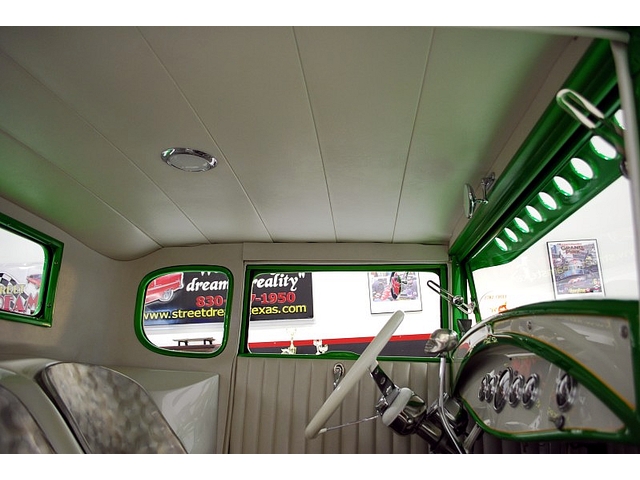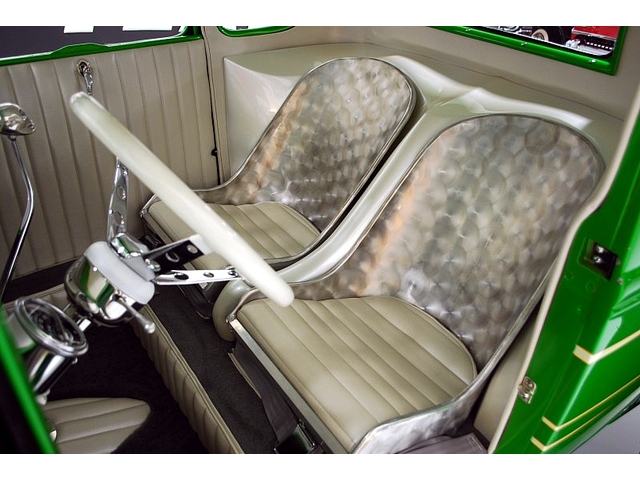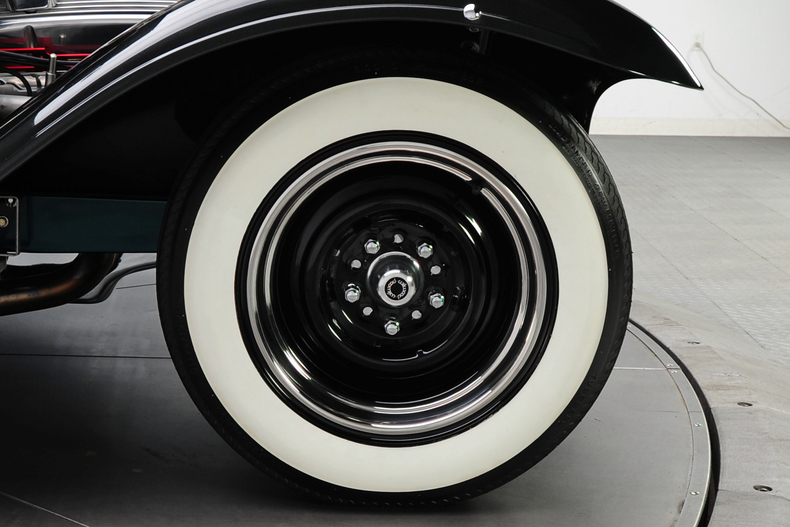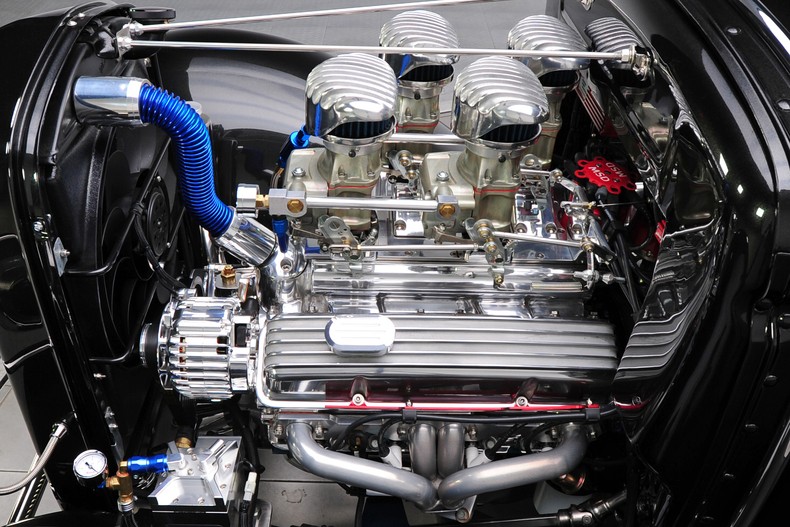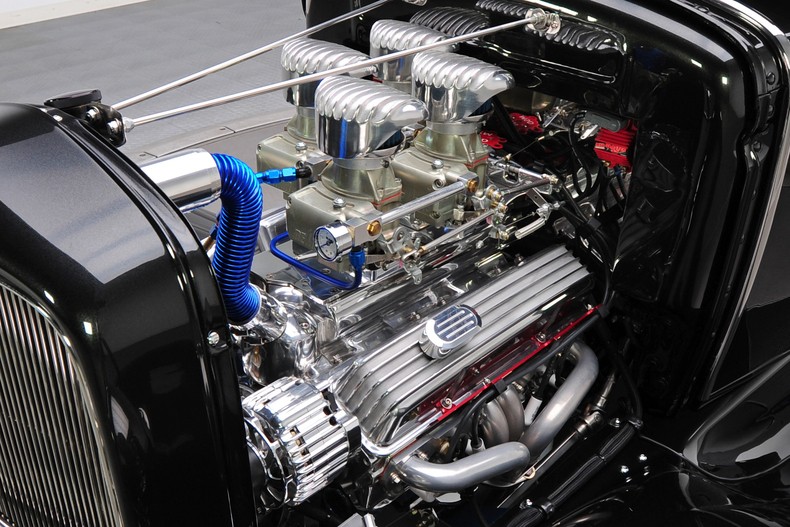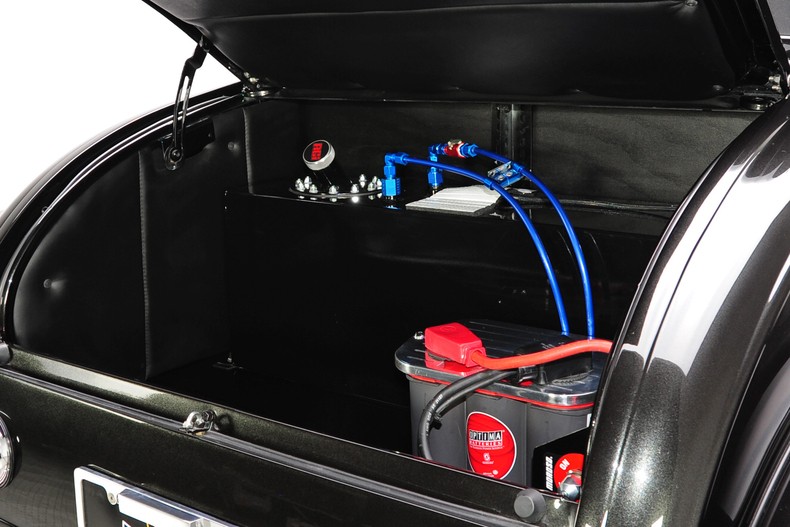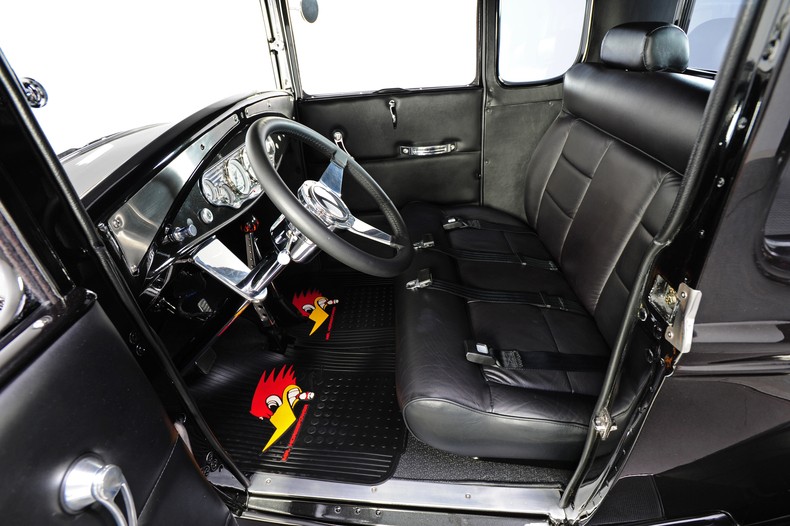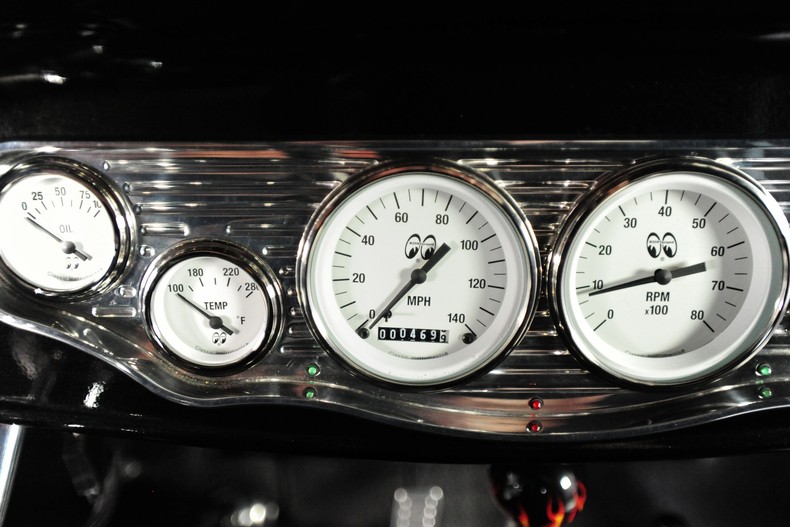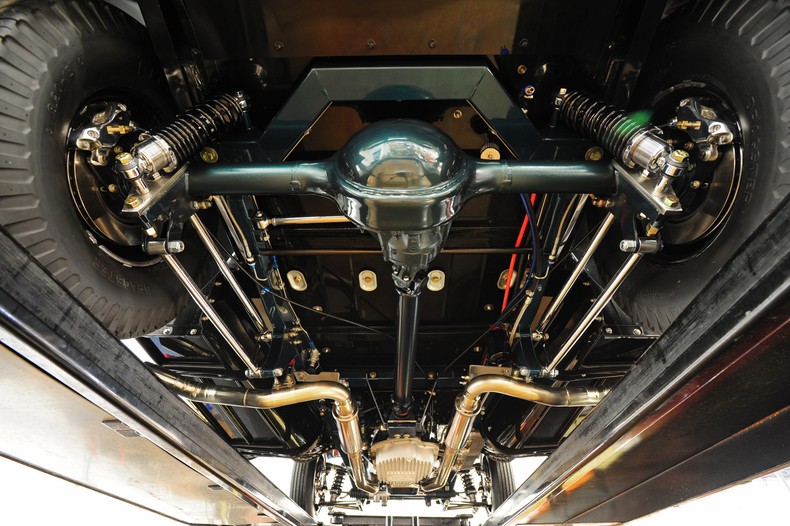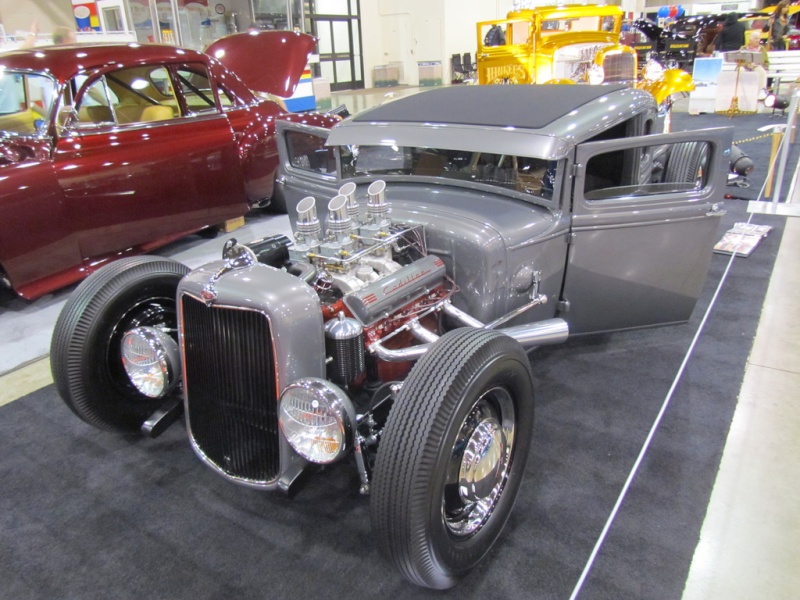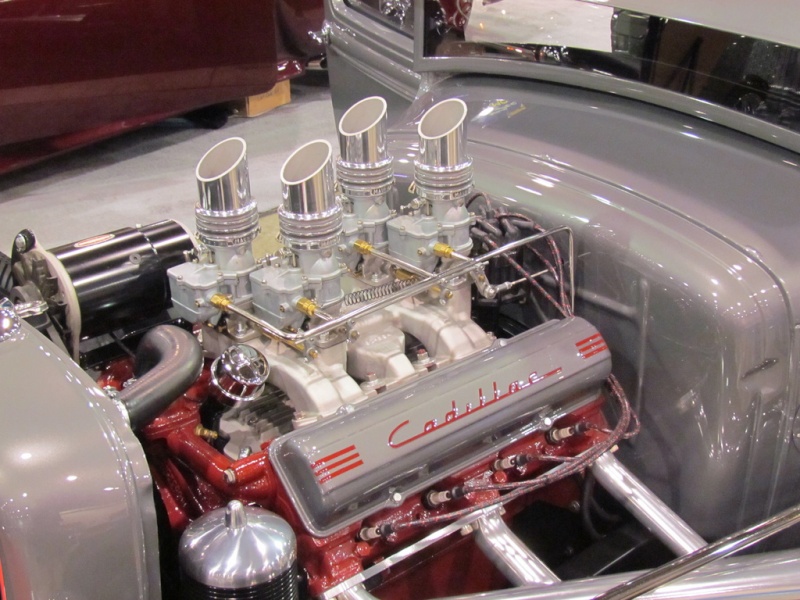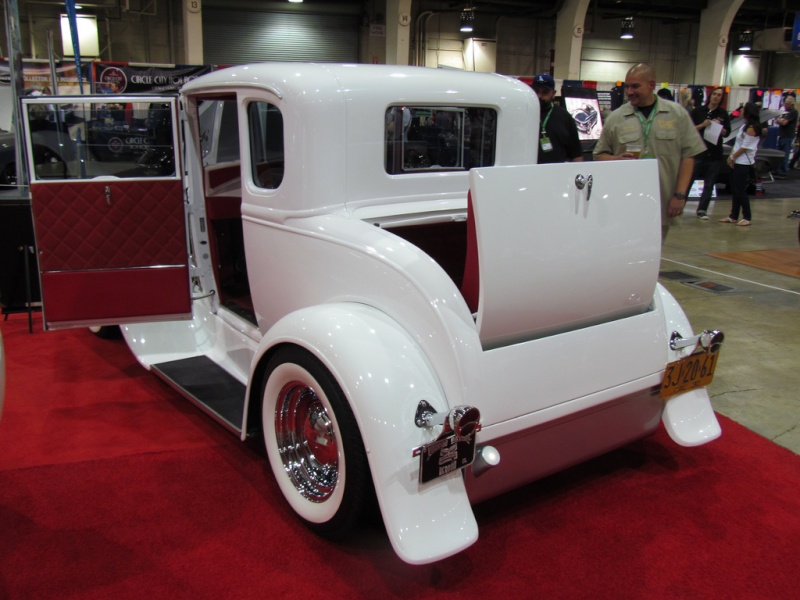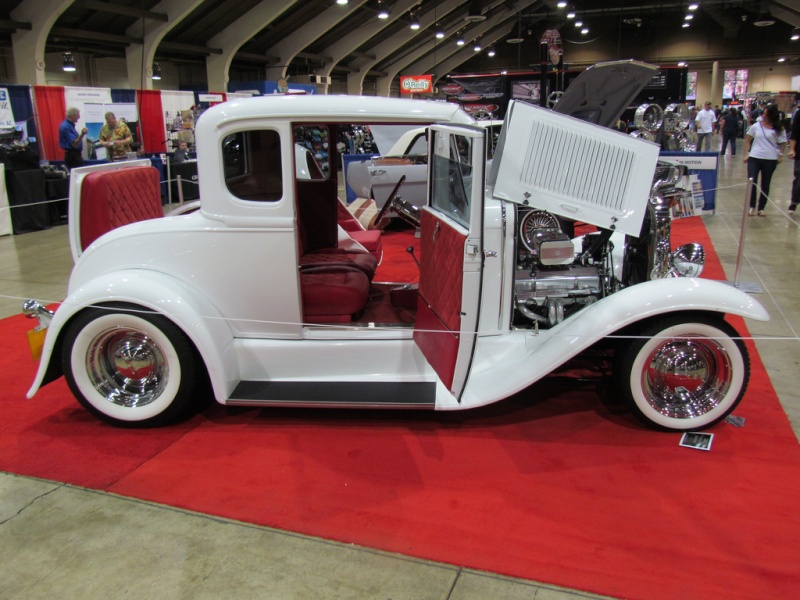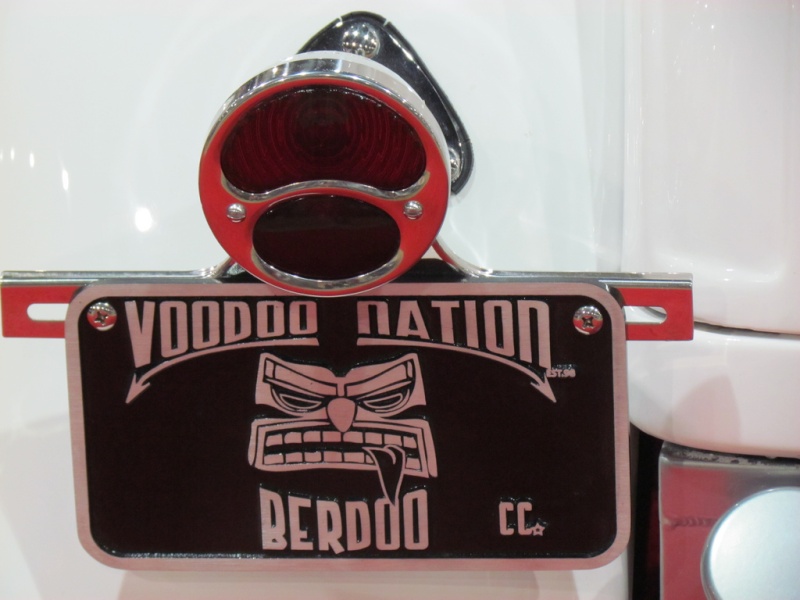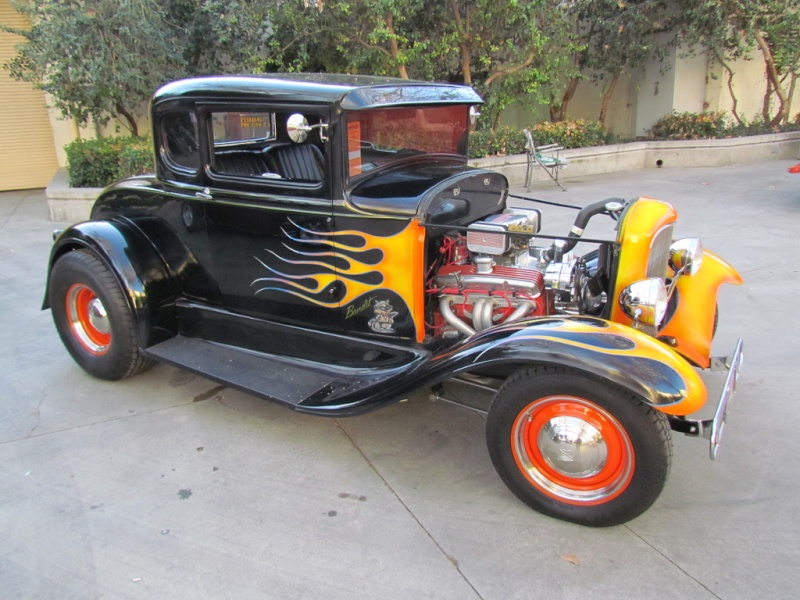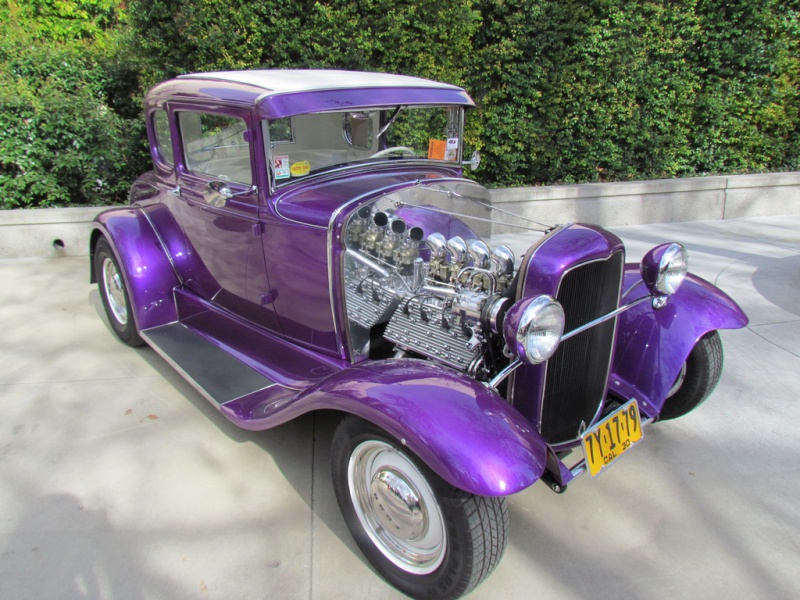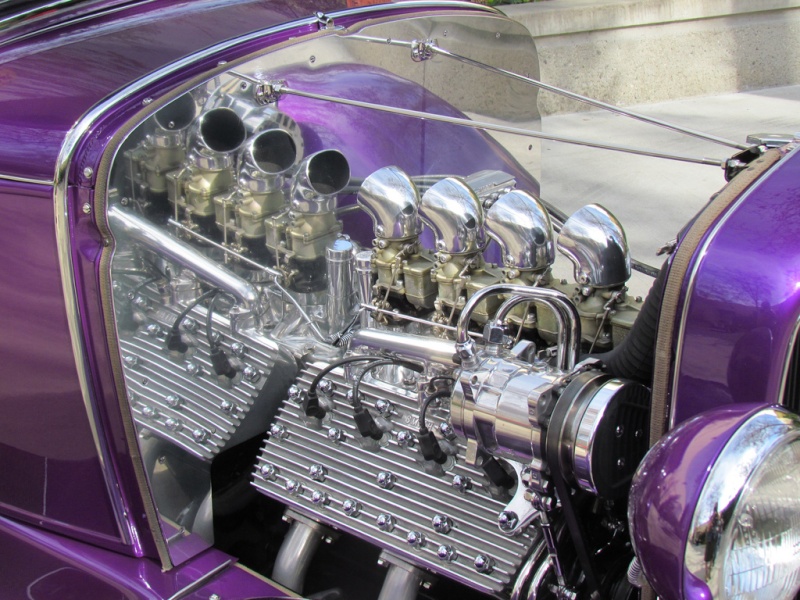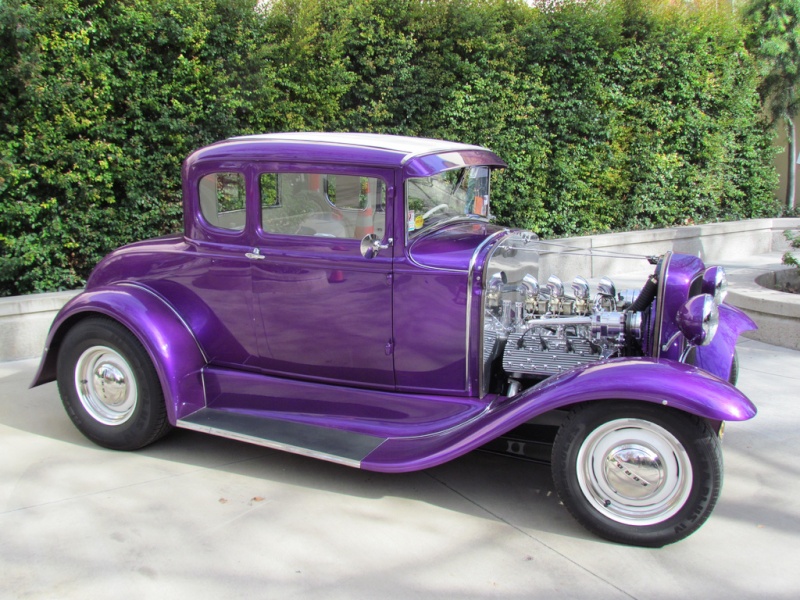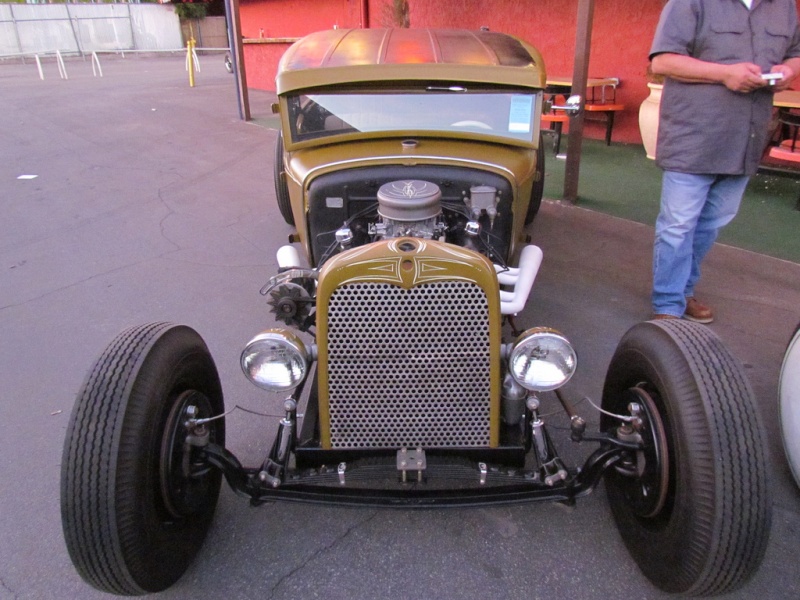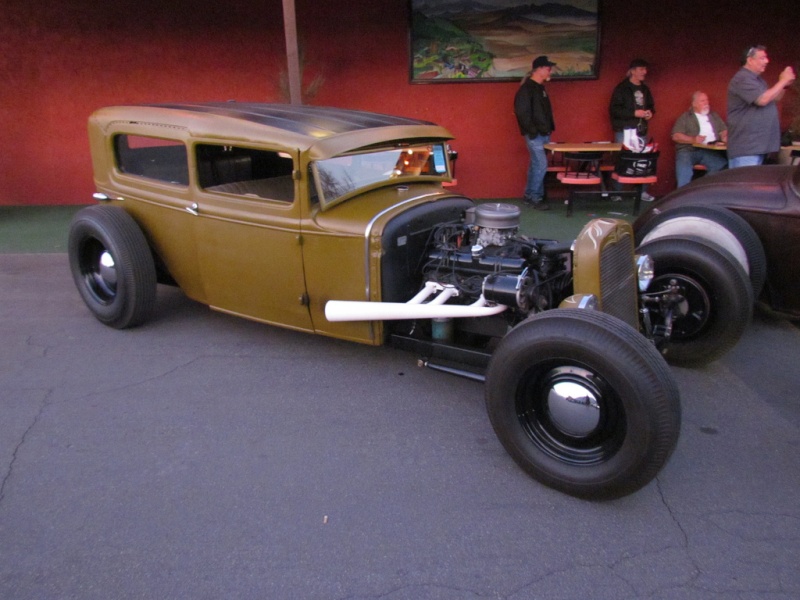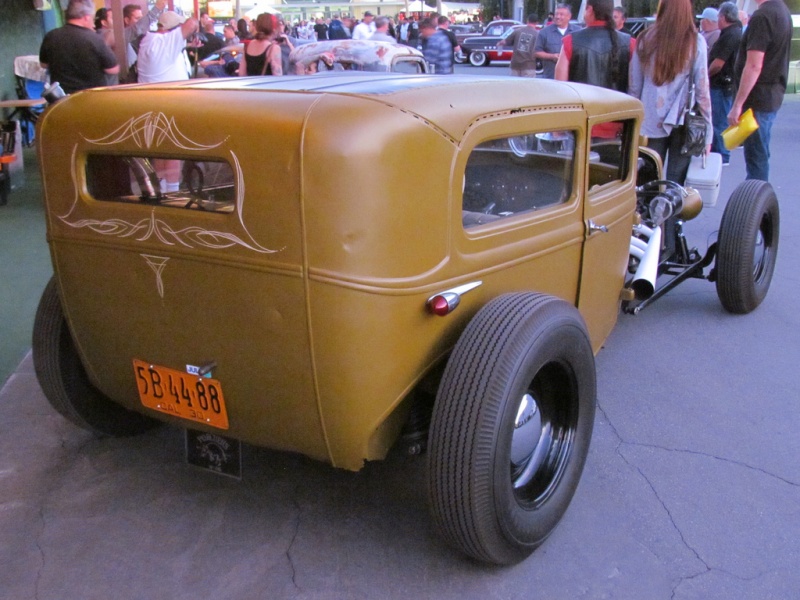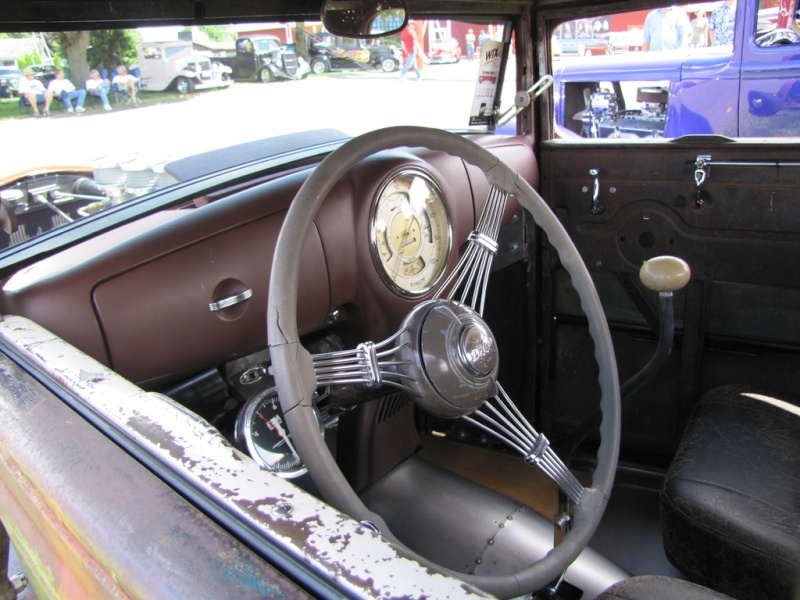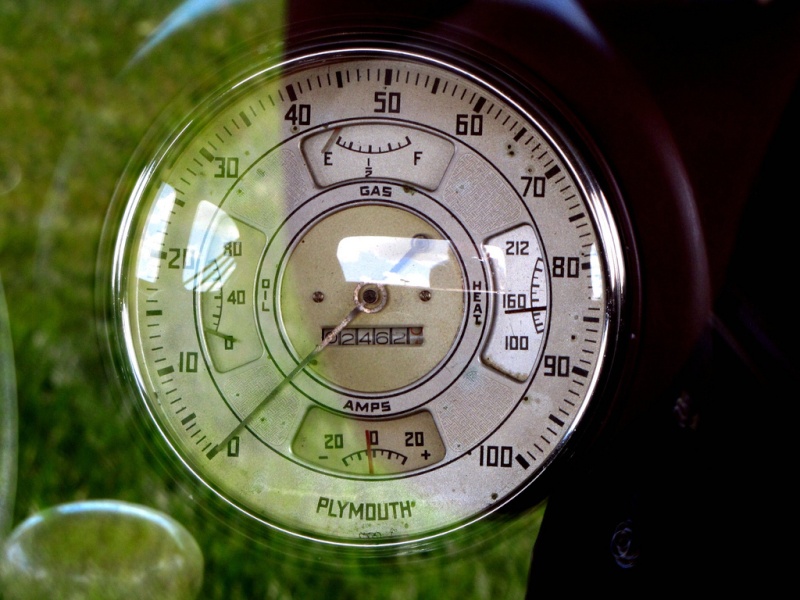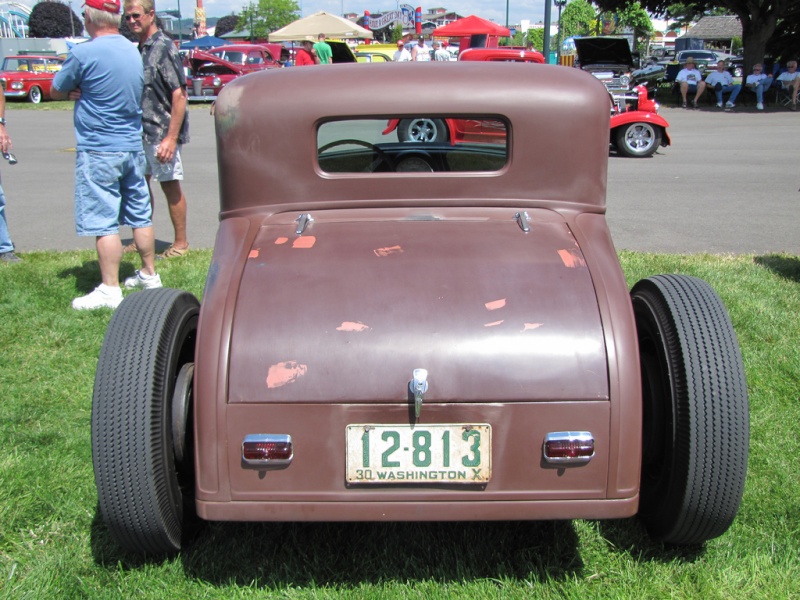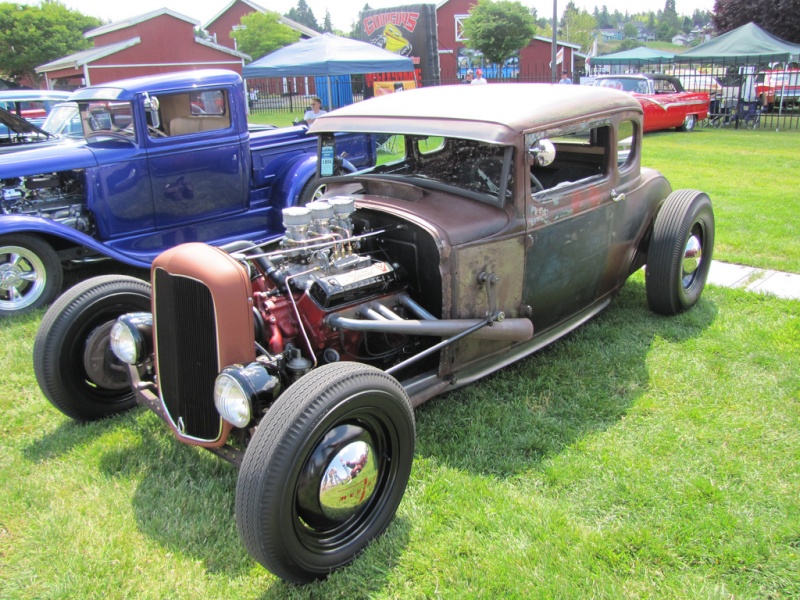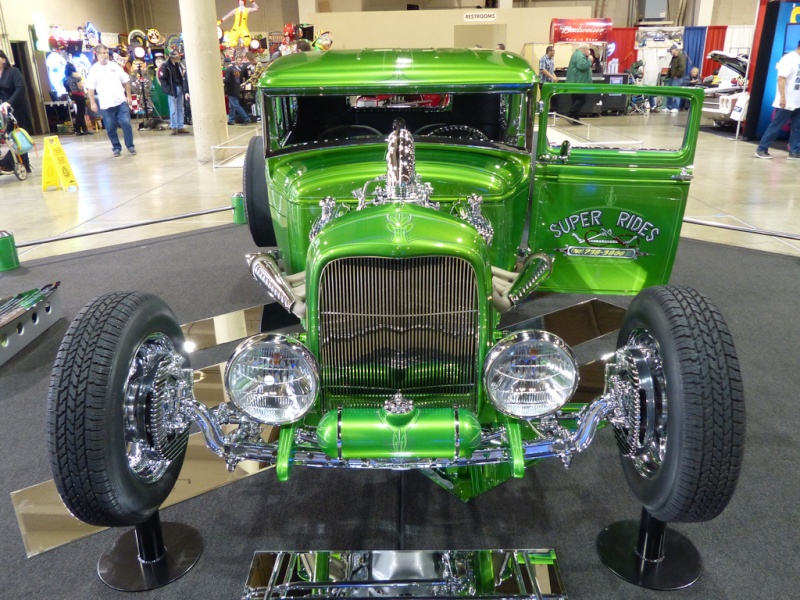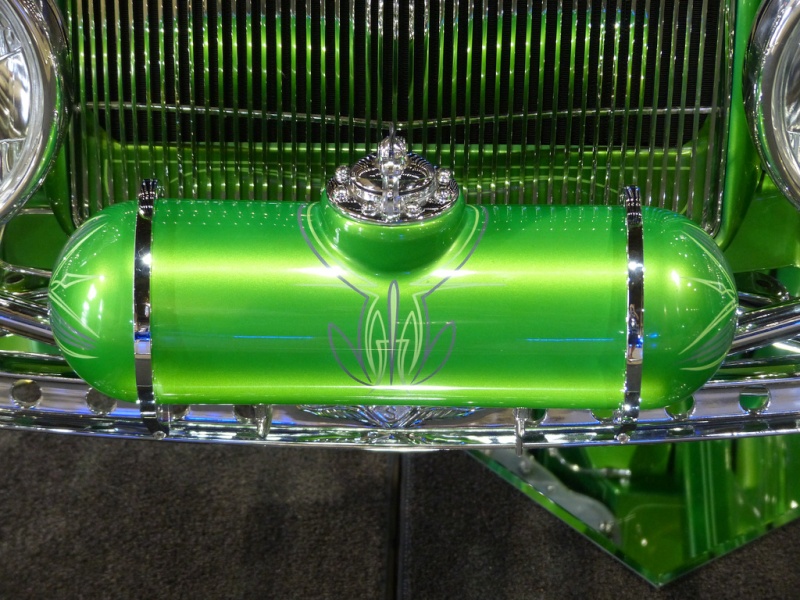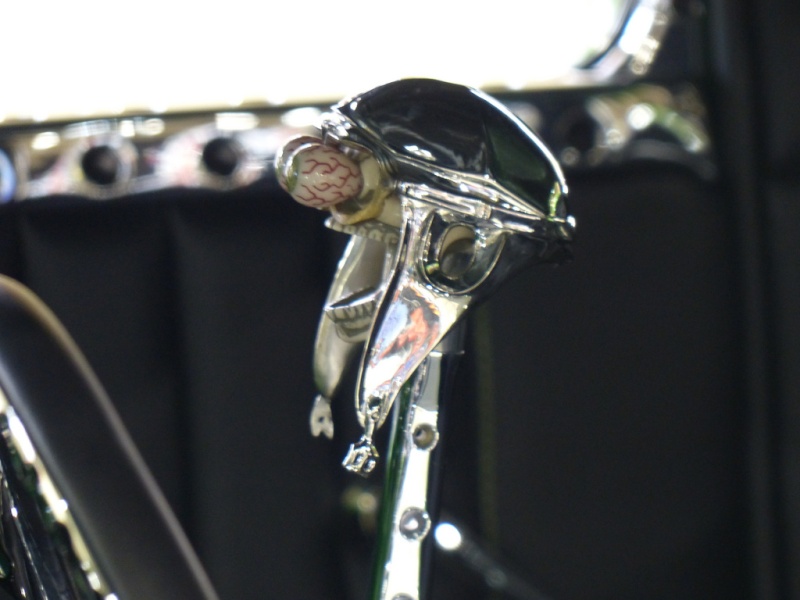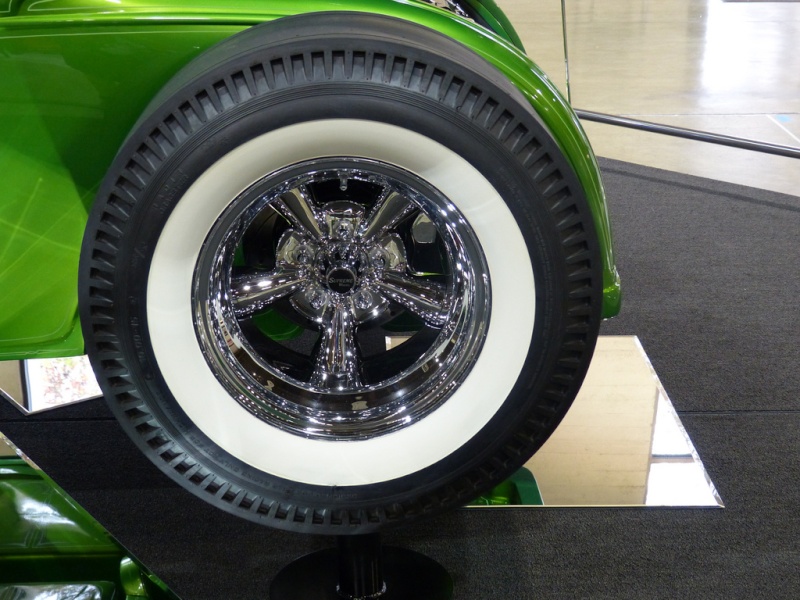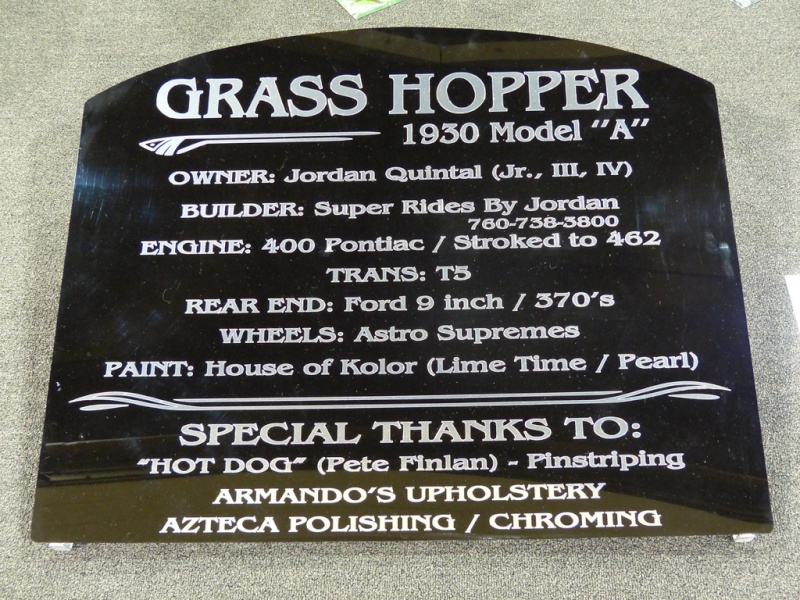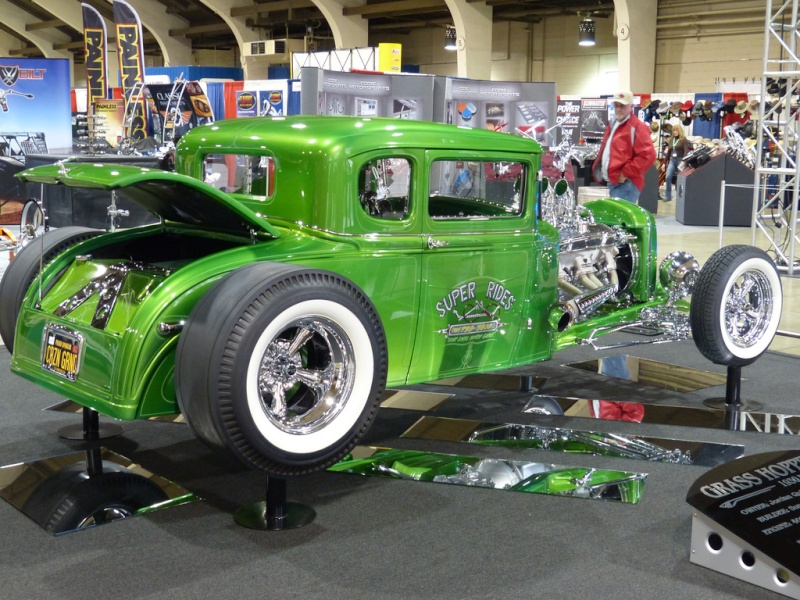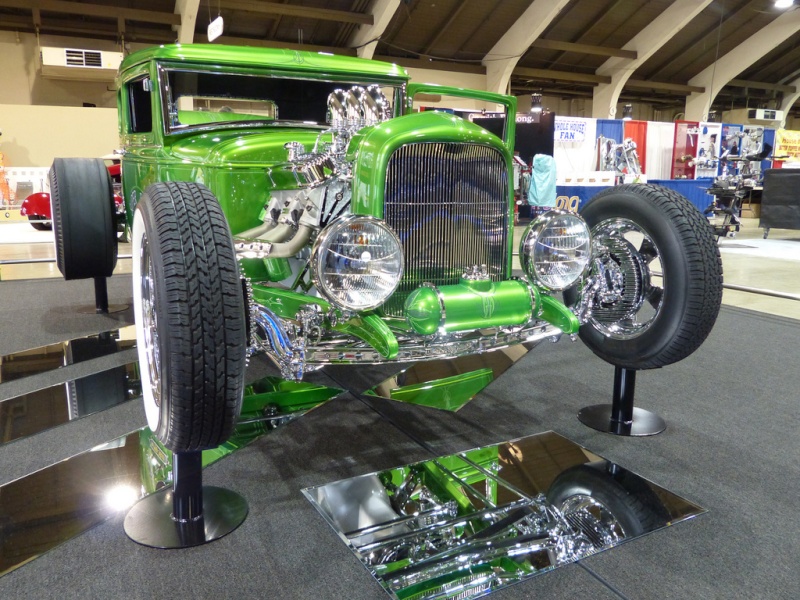1930 Ford hot rod
+2
catfishvince
Predicta
6 participants
Page 1 sur 7
Page 1 sur 7 • 1, 2, 3, 4, 5, 6, 7 
 1930 Ford Model A hot rod
1930 Ford Model A hot rod
Projects start for countless reasons. Dick Rash's 1930 Ford Model A coupe started out as a bet. "I bet him that he couldn't build a car without going overboard," Marshall Woolery says.
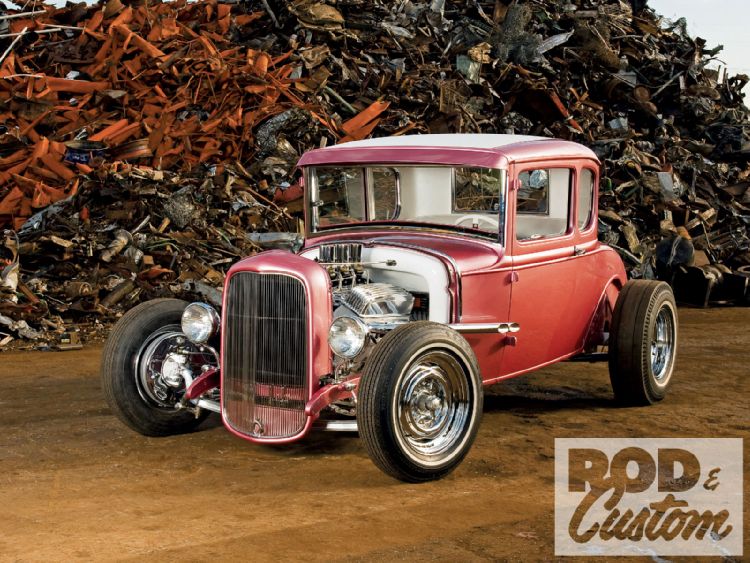
Dick knows overboard. Prior to the coupe, he hired Woolery at Thun Field Rod & Custom to build a '36 Ford. It was an invitation for excess; it came to him as a five-window shell and a bunch of Chip Foose illustrations that showed how it would look as a roadster.
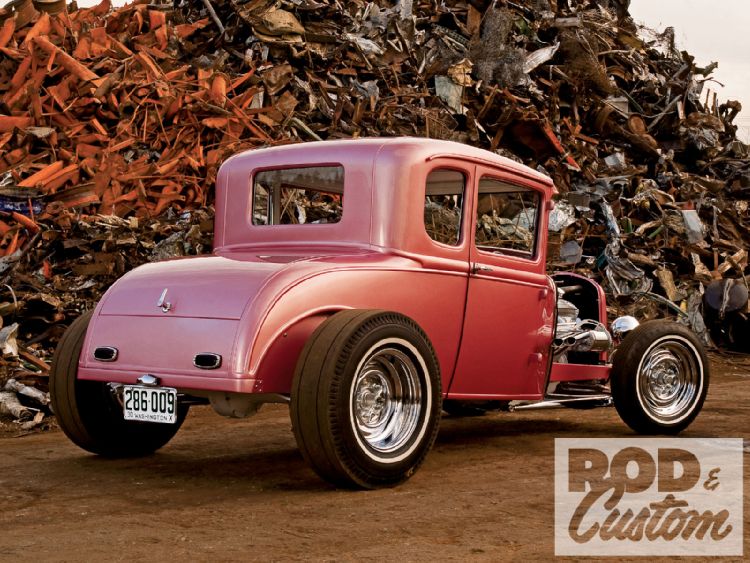
Dubbed "Sublime," it turned out as a Foose-drawn car should, glorious, hence its name. "Dick ended up [having us] build a full-on indoor show car. Then he discovered that he didn't like indoor car shows," Woolery says. "After we went so overboard on the '36, [Woolery] tried to talk me into the ol' flat black 'let's drive the thing' idea," Dick says.
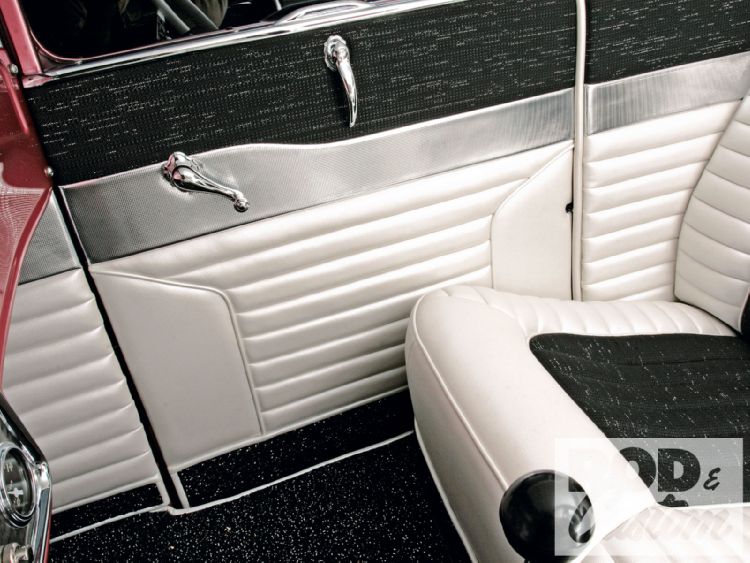
One look and you'll know who lost that bet. "He can't not go overboard," Woolery says. Though lost, this wager has a distinct chrome-plated lining: Dick's coupe is probably one of the neatest if not most faithful interpretations of a show rod built at the cusp of the '60s-the era that pretty much defined the term overboard as far as hot rods go.
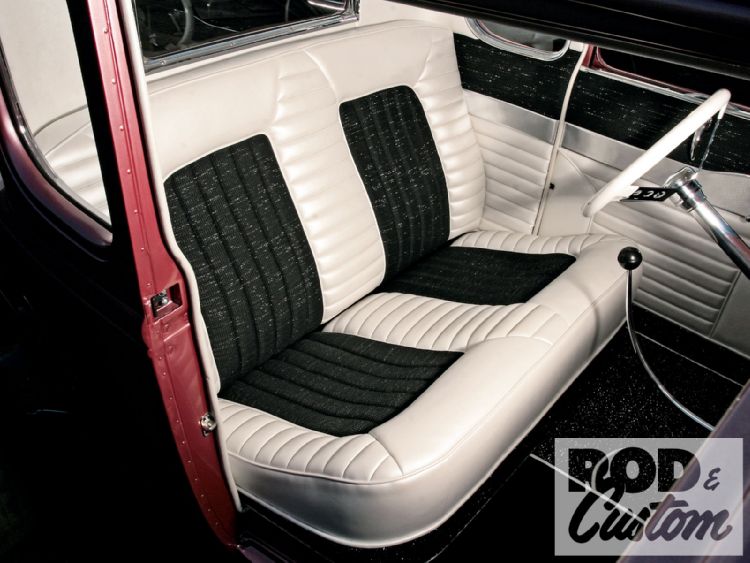
An Amethyst In The Rough "I started building the car for myself," Woolery says. He horse-traded his way into a Model A coupe project partly for its Total Cost Involved chassis, but primarily to avoid having to help a friend repair the rough and badly chopped body that sat on it. Initially resigned to forsake the body as a lost cause, Woolery rejoined and used it anyway when the prior owner proposed that Woolery couldn't rather than wouldn't repair it. "It was supposed to be just flat black with a used motor and transmission-just stuff we had lying around the shop," he says.
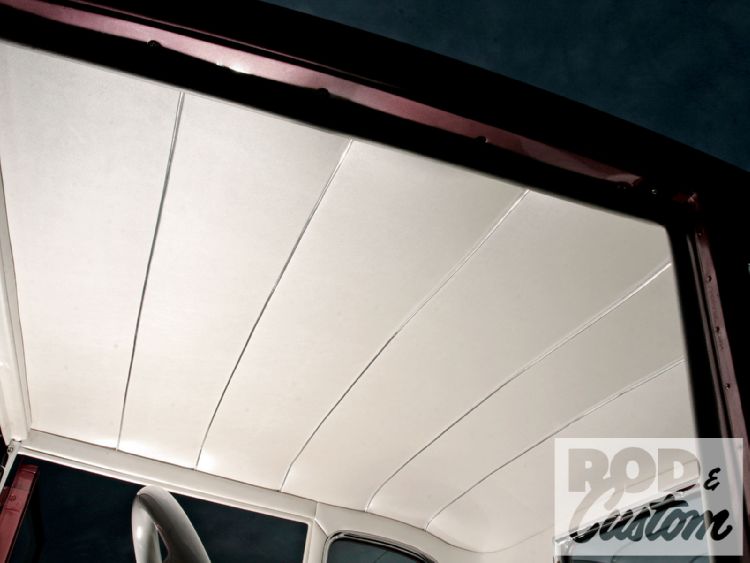
And, in fact, it probably would've gone that way if Dick and his wife, Helen, hadn't seen it in front of Woolery's shop. By that point the car had acquired a good running Y-block from a friend's pickup, a steering box from a long-gone Falcon, and a '40 rear axle from Calbag Metals-the same scrap yard that served as the backdrop for this car's shoot. "I sort of figured that I'd build it to look the way a car would've looked in about 1959 or 1960," Woolery says.
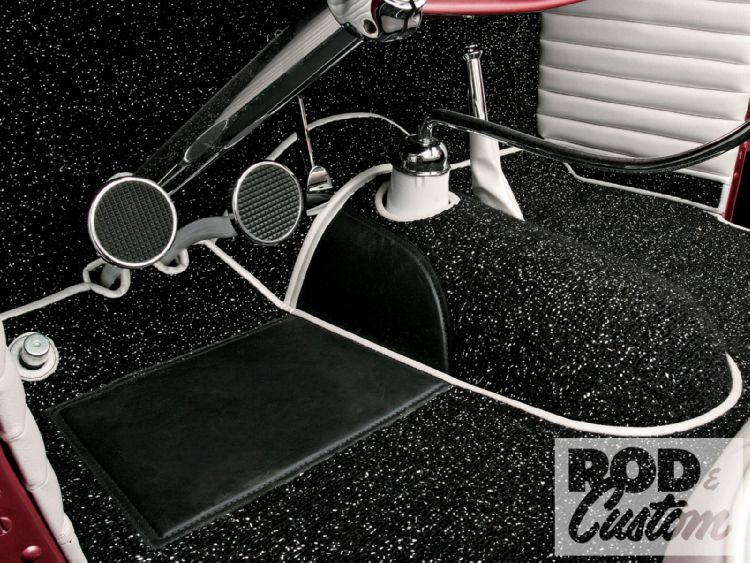
Dick admitted finding that last part most appealing. Prior to succumbing to the mistress of gluttony on the '36 he was a horseless carriage guy. For those who don't know, horseless carriages are the brass-laden veteran jobs from just after the turn of the century, a period when only the wealthy could own an automobile. Restoring them, as he'd done with the ones he owned, requires a fair bit of research since the cars are frequently wasted and rarely intact. At the very least his wife, who put up with his old-car capers, approved if not actually admitted to finding the chopped-up coupe pretty cool. Apparently the gods found the prospect of him doing another period car appealing too. Soon after Dick committed to the car, one of Woolery's friends offered to trade a near mint, un-chopped body for the butchered one. Only Woolery elected to not chop this one's top.
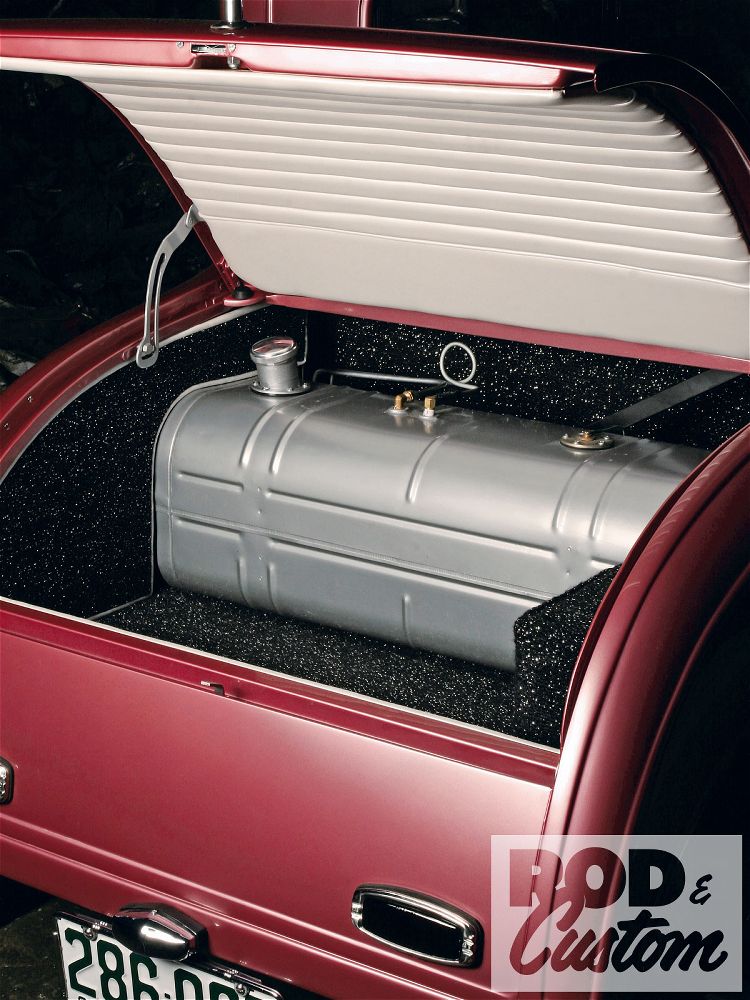
Besides crazy colors, raked stances, and chrome aplenty, one of the things common to late '50s/early '60s hot rods was excessively channeled stock-top bodies. Channeling to old standards-8 inches wasn't uncommon-would obliterate any interior space, but Woolery said he knew that if he channeled the body just enough to conceal the frame's cross section he could hide a step in the frame behind the firewall that would make the body appear to be channeled to a greater degree. That way the body would only lose 3 inches of headroom instead of the 7 or more inches necessary to chop the body enough to look right and channel it sufficiently to conceal the narrower Model A chassis.
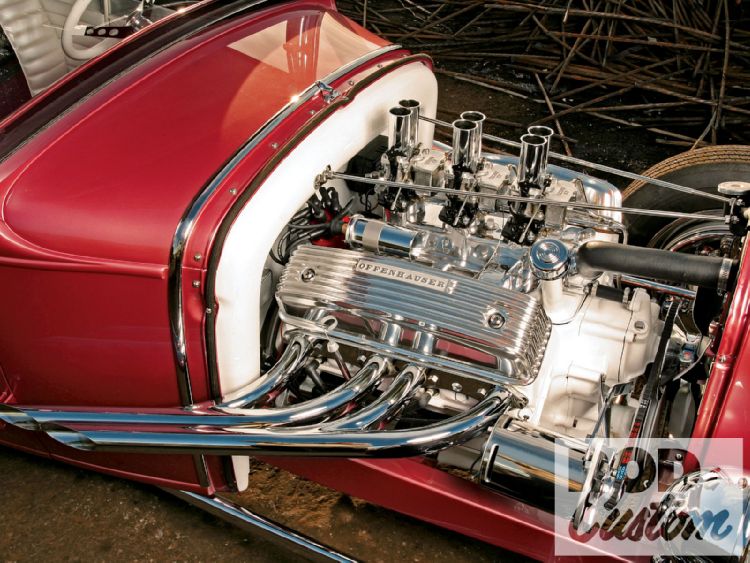
Dick certainly approved. "I've gotten rid of cars just because I had to hunch over to see anything," he says. Though the body was nice to start, the floors weren't. So Mark Veltkamp, who worked for Woolery as part of his high school's work-shadow program, replaced them.

After channeling and roughing in the body, Woolery delivered it to Dick, who turned it over to Shawn Harvey, thus initiating the slippery slope of excess. "We told him to get the car nice enough so it would look good in flat black," Woolery says. "Well the instant it was in filler primer, Dick started seeing little things here and there." Though Woolery held his ground on an economical finish, "I just couldn't do it," Dick says. Woolery recused himself. "At that point it was at Dick's house so it was out of my control."
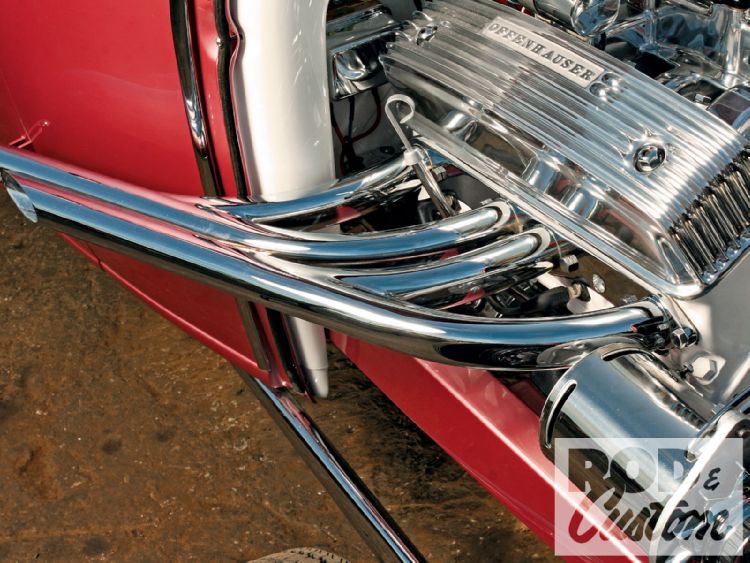
Then detailer Jason Kilmer dropped by. "So he sees it and starts putting his two cents in," Woolery says, groaning. "The whole time I've been arguing to not paint the car but Dick just couldn't leave it alone. He had to paint it."
But what color? Resigned to the idea of shiny paint, Woolery took Dick color shopping. "We were looking for something that came out in that (early '60s) period," Dick says. Then it struck them.
General Motors called one of the colors applied to the '59 Pontiac Royal Amethyst Poly, but to everyone else, "It's pink," Woolery says. "Everybody who sees it thinks that Helen picked it. Nope. That's Dick's choice. And really, it's the right color for that car," he says. Shawn Harvey, who worked on the '36, juiced it. The least Kilmer could do after encouraging Dick to paint the car was cut and rub the finish.
"Paint changed everything," Woolery says. "Now that we had a fresh new paintjob, Dick's like 'Well, do we really want to run a used engine?' " Dick bought a rebuilt Y-block, an old stock piece from Hagen's Hiway Auto Parts, a local obsolete parts emporium. Woolery and his sidekick, Russell Jadin, disassembled it to replace the rings that probably took a set over the years and, for good measure, replaced the cam with a lumpier one from Delta Camshafts. Toni Rosser at RT Hot Rods helped out by scaring up hardware. "It's the only real hot rod parts store in this area," Woolery says.
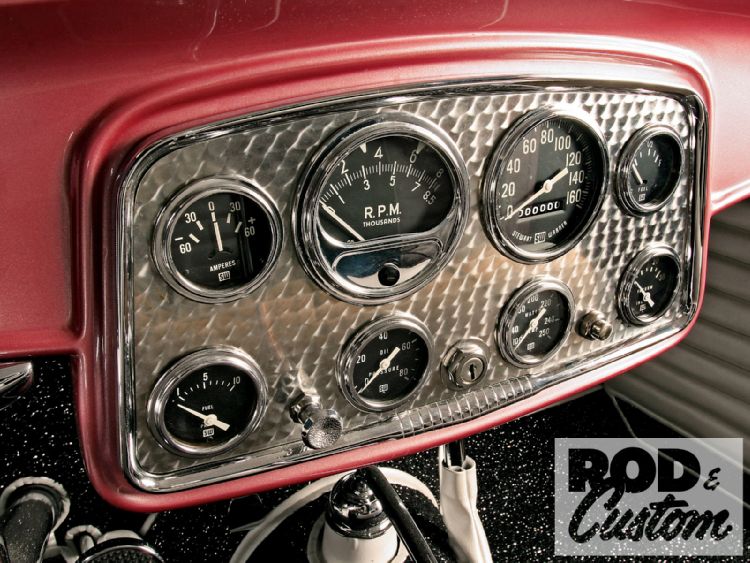
They say the road to hell is paved with good intentions. "Now that we were going to paint everything, and we already had the engine apart, we should probably grind the block smooth," Woolery says. "Stupid move," he admitted. "Have you ever ground a Y-block? It's a high-nickel casting.
"That's when things started getting out of control," he says. He delivered the Offy manifold and rocker covers to his polisher, Paul McNeely. "He knows how fussy I can get. Dick's fussy too. So instead of doing a normal job he'd do for a normal person, [McNeely] just went overboard," Woolery says.
Detailing is like a C2 narcotic; a little bit is too much and a whole lot is never enough. "Things just started snowballing," Woolery says. "Then we noticed that we needed more chrome here and there. In one sense it went along with the '59-60 theme ... but we tried to keep it from being too gaudy," he says. If he only knew what he was in for.
When Paul Reichlin got the body, he got a box of '59 and '60 magazines, and the following request: "Make the upholstery look like something that's supposed to be in there," Woolery says.
Study show cars from the decadent period that turned hot rods into show cars, and you'll know the potential danger in such creative license. The upholstery world changed due in part to the "factory custom" era ushered in with the '58 models. Suddenly, trimmers had a host of wild pearls, metallics, brocades, and patterned foils from which to choose and a free-for-all ensued. For the sake of one-upmanship, trimmers frequently turned good taste right on its head. Pleats went every which way, piping outlined shapes that weren't there, and unlikely material pairings met in unlikeable ways. Interiors got, for the lack of a better term, hideous. Still, Woolery affirmed his faith: "[Reichlin] is the best you can get."
Article original:
http://www.rodandcustommagazine.com/featuredvehicles/1010rc_1930_ford_model_a_coupe/

Dick knows overboard. Prior to the coupe, he hired Woolery at Thun Field Rod & Custom to build a '36 Ford. It was an invitation for excess; it came to him as a five-window shell and a bunch of Chip Foose illustrations that showed how it would look as a roadster.

Dubbed "Sublime," it turned out as a Foose-drawn car should, glorious, hence its name. "Dick ended up [having us] build a full-on indoor show car. Then he discovered that he didn't like indoor car shows," Woolery says. "After we went so overboard on the '36, [Woolery] tried to talk me into the ol' flat black 'let's drive the thing' idea," Dick says.

One look and you'll know who lost that bet. "He can't not go overboard," Woolery says. Though lost, this wager has a distinct chrome-plated lining: Dick's coupe is probably one of the neatest if not most faithful interpretations of a show rod built at the cusp of the '60s-the era that pretty much defined the term overboard as far as hot rods go.

An Amethyst In The Rough "I started building the car for myself," Woolery says. He horse-traded his way into a Model A coupe project partly for its Total Cost Involved chassis, but primarily to avoid having to help a friend repair the rough and badly chopped body that sat on it. Initially resigned to forsake the body as a lost cause, Woolery rejoined and used it anyway when the prior owner proposed that Woolery couldn't rather than wouldn't repair it. "It was supposed to be just flat black with a used motor and transmission-just stuff we had lying around the shop," he says.

And, in fact, it probably would've gone that way if Dick and his wife, Helen, hadn't seen it in front of Woolery's shop. By that point the car had acquired a good running Y-block from a friend's pickup, a steering box from a long-gone Falcon, and a '40 rear axle from Calbag Metals-the same scrap yard that served as the backdrop for this car's shoot. "I sort of figured that I'd build it to look the way a car would've looked in about 1959 or 1960," Woolery says.

Dick admitted finding that last part most appealing. Prior to succumbing to the mistress of gluttony on the '36 he was a horseless carriage guy. For those who don't know, horseless carriages are the brass-laden veteran jobs from just after the turn of the century, a period when only the wealthy could own an automobile. Restoring them, as he'd done with the ones he owned, requires a fair bit of research since the cars are frequently wasted and rarely intact. At the very least his wife, who put up with his old-car capers, approved if not actually admitted to finding the chopped-up coupe pretty cool. Apparently the gods found the prospect of him doing another period car appealing too. Soon after Dick committed to the car, one of Woolery's friends offered to trade a near mint, un-chopped body for the butchered one. Only Woolery elected to not chop this one's top.

Besides crazy colors, raked stances, and chrome aplenty, one of the things common to late '50s/early '60s hot rods was excessively channeled stock-top bodies. Channeling to old standards-8 inches wasn't uncommon-would obliterate any interior space, but Woolery said he knew that if he channeled the body just enough to conceal the frame's cross section he could hide a step in the frame behind the firewall that would make the body appear to be channeled to a greater degree. That way the body would only lose 3 inches of headroom instead of the 7 or more inches necessary to chop the body enough to look right and channel it sufficiently to conceal the narrower Model A chassis.

Dick certainly approved. "I've gotten rid of cars just because I had to hunch over to see anything," he says. Though the body was nice to start, the floors weren't. So Mark Veltkamp, who worked for Woolery as part of his high school's work-shadow program, replaced them.

After channeling and roughing in the body, Woolery delivered it to Dick, who turned it over to Shawn Harvey, thus initiating the slippery slope of excess. "We told him to get the car nice enough so it would look good in flat black," Woolery says. "Well the instant it was in filler primer, Dick started seeing little things here and there." Though Woolery held his ground on an economical finish, "I just couldn't do it," Dick says. Woolery recused himself. "At that point it was at Dick's house so it was out of my control."

Then detailer Jason Kilmer dropped by. "So he sees it and starts putting his two cents in," Woolery says, groaning. "The whole time I've been arguing to not paint the car but Dick just couldn't leave it alone. He had to paint it."
But what color? Resigned to the idea of shiny paint, Woolery took Dick color shopping. "We were looking for something that came out in that (early '60s) period," Dick says. Then it struck them.
General Motors called one of the colors applied to the '59 Pontiac Royal Amethyst Poly, but to everyone else, "It's pink," Woolery says. "Everybody who sees it thinks that Helen picked it. Nope. That's Dick's choice. And really, it's the right color for that car," he says. Shawn Harvey, who worked on the '36, juiced it. The least Kilmer could do after encouraging Dick to paint the car was cut and rub the finish.
"Paint changed everything," Woolery says. "Now that we had a fresh new paintjob, Dick's like 'Well, do we really want to run a used engine?' " Dick bought a rebuilt Y-block, an old stock piece from Hagen's Hiway Auto Parts, a local obsolete parts emporium. Woolery and his sidekick, Russell Jadin, disassembled it to replace the rings that probably took a set over the years and, for good measure, replaced the cam with a lumpier one from Delta Camshafts. Toni Rosser at RT Hot Rods helped out by scaring up hardware. "It's the only real hot rod parts store in this area," Woolery says.

They say the road to hell is paved with good intentions. "Now that we were going to paint everything, and we already had the engine apart, we should probably grind the block smooth," Woolery says. "Stupid move," he admitted. "Have you ever ground a Y-block? It's a high-nickel casting.
"That's when things started getting out of control," he says. He delivered the Offy manifold and rocker covers to his polisher, Paul McNeely. "He knows how fussy I can get. Dick's fussy too. So instead of doing a normal job he'd do for a normal person, [McNeely] just went overboard," Woolery says.
Detailing is like a C2 narcotic; a little bit is too much and a whole lot is never enough. "Things just started snowballing," Woolery says. "Then we noticed that we needed more chrome here and there. In one sense it went along with the '59-60 theme ... but we tried to keep it from being too gaudy," he says. If he only knew what he was in for.
When Paul Reichlin got the body, he got a box of '59 and '60 magazines, and the following request: "Make the upholstery look like something that's supposed to be in there," Woolery says.
Study show cars from the decadent period that turned hot rods into show cars, and you'll know the potential danger in such creative license. The upholstery world changed due in part to the "factory custom" era ushered in with the '58 models. Suddenly, trimmers had a host of wild pearls, metallics, brocades, and patterned foils from which to choose and a free-for-all ensued. For the sake of one-upmanship, trimmers frequently turned good taste right on its head. Pleats went every which way, piping outlined shapes that weren't there, and unlikely material pairings met in unlikeable ways. Interiors got, for the lack of a better term, hideous. Still, Woolery affirmed his faith: "[Reichlin] is the best you can get."
Article original:
http://www.rodandcustommagazine.com/featuredvehicles/1010rc_1930_ford_model_a_coupe/
_________________
We don't care the People Says , Rock 'n' roll is here to stay - Danny & the Juniors - 1958
 1930 Ford hot rod
1930 Ford hot rod
1930 Model T sedan - Steve DeMarco
So before you warm up your computer’s email system or sharpen your poison pen, STREET RODDER is very aware that Ford did not manufacture a Model T sedan in 1930. But that doesn’t mean an inventive hot rodder couldn’t create such an animal, and Steve DeMarco is just that kind of guy.

If the name is familiar, then you may have done some business with Carolina Custom Hot Rod Parts in Clinton, North Carolina. Started in 1985, Carolina Custom is a 10,000-square-foot grocery store for the hot rod enthusiast, offering parts from more than 50 different manufacturers from their base as well as the over the Internet. They manufacture their own line of parts, too, making the products on site (with some of them having gone on to win multiple Best New Product awards at the NSRA Nationals in past years). So it shouldn’t be a surprise to learn Steve wanted to utilize what was around him to build a hot rod for himself, only this wasn’t going to be a “normal” type of ride.
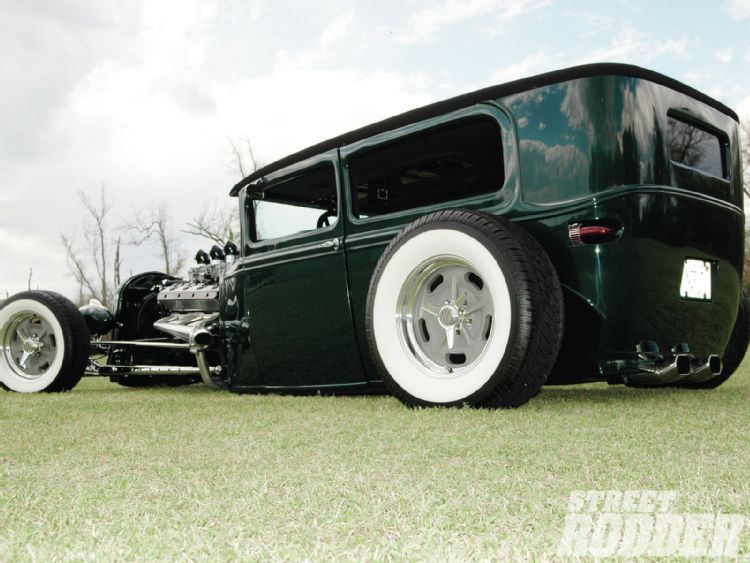
When the lid gets lowered... read full captionWhen the lid gets lowered this much you have to design and build one-off seats. Wayne Bowers did the work, covering the interior with a green and black pleat design while the roof was done with black Mercedes cloth. The tilt/tele column also helps with the severe chop and Hainline gauges fill the modified Model A dash.The original plan was to find a Model T sedan and slip a Hemi between the framerails. But, as any rodder knows, car builds don’t always follow the original plan of attack and Steve was able to find a decent Model A sedan, which he figured he could modify to make it look like the T he really wanted. A simple idea, but a lot of work to get right!
The frame is where it all started, and it was stretched 18 inches over stock. There are airbags from RideTech on each corner, but well hidden from view. The rest of the suspension reads like a regular traditional-inspired ride, with a Super Bell chrome axle, ’48 Ford wishbones up front, and Pete & Jake four-bar out back with the Ford 9-inch. Updated parts include front and rear disc brakes.
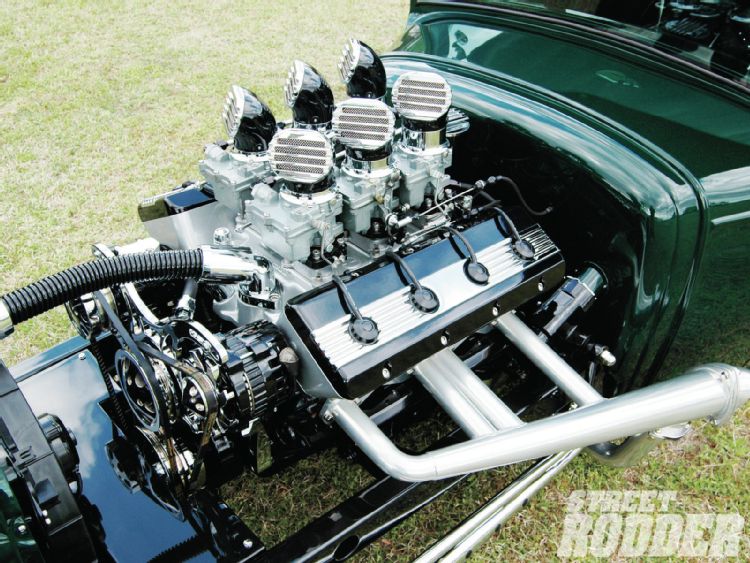
The engine is a small-block, designed with special one-off parts to make it look more like a Hemi. Steve made the engine’s head covers, which do a good job of hiding the Chevy heads, and a six-pot manifold set up for Strombergs was converted to work with a sextet of Rochester two-barrels. Even the distributor was redesigned to look like a magneto, and new air horns (fitted with air cleaners) were fabbed. Sanderson Limefire headers were installed, too, to complete the engine. American Racing Salt Flat wheels (15x6 and 16x7) are shod in Diamond Back wide-white radials (195/65-15 and 255/70-16).
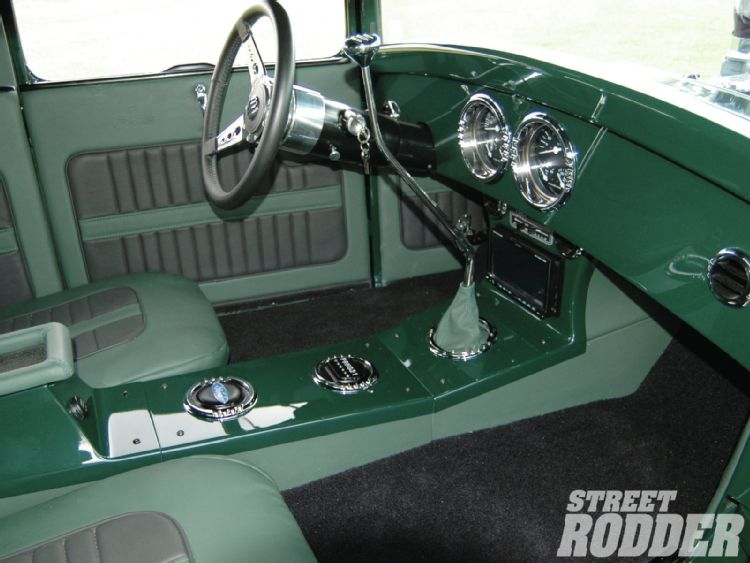
When the lid gets lowered... read full captionWhen the lid gets lowered this much you have to design and build one-off seats. Wayne Bowers did the work, covering the interior with a green and black pleat design while the roof was done with black Mercedes cloth. The tilt/tele column also helps with the severe chop and Hainline gauges fill the modified Model A dash.The Model A body was massaged quite heavily, having been channeled (6 inches) and chopped (6 inches in the rear, 3 up front). Along with a smoothed firewall and cowl, the windshield was designed to fit flush, and the roof was removed and replaced with a flat fiberglass piece (making the car 41 inches at the sunvisor). The squarish look in the car’s corners and on the roof is what gives the impression of a Model T at first glance.
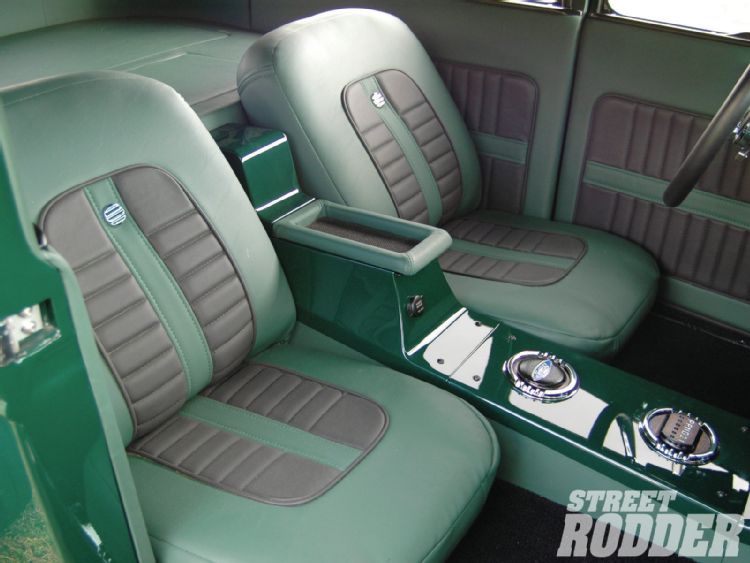
Once the bodywork was completed the chassis was painted black and the body a Rock Moss Green by Wendell Procter. Under the low lid Wayne Bowers upholstered custom bucket seats and then added black Mercedes cloth to the roof. The gauges in the custom-fabbed dash came from Hainline and a tilt/tele Cadillac steering column works with a Flaming River steering box to get the ride down the road.
Once painted and polished up, Steve debuted the sedan at the Myrtle Beach Rod Run to the Sun alongside 2,800 others cars. It received a lot of attention and, by the end of the show, it won the event’s Car of the Year award. STREET RODDER also liked what they saw when viewing the car for the first time at the Goodguys Charlotte event a few months ago and picked it as a finalist in the magazine’s Top 100 program.

But the one comment Steve remembers from all the folks who came up to talk to him about the car (they usually start talking before he has a chance to get out of the car!) is the one fellow who said Steve’s car reminds him of a rat rod in a tuxedo!
The ride rolls on American... read full caption
The ride rolls on American Racing Salt Flat wheels (15x6 and 16x7) wrapped in Diamond Back radials (195/65 and 255/70). In this shot you can see the ’59 Caddy taillights that have been sectioned into the body.
After the chop was done (6... read full caption
After the chop was done (6 inches up front, 3 in the rear) a flat fiberglass roof section was added to give the car a Model T appearance, along with the body’s squared-up corners.Tech Tips
COMP Cams
Collect lifters by rolling the block
When removing a cam and/or lifters from an LS-series block, remember to roll the motor over by hand after removing the pushrods and rockers. This will allow the lifters to seat themselves into the hold-down tray and keep them from falling into the block.
FAST
Power problems
When installing an EZ-EFI system, it is critical that you make sure the pink wire on the harness is getting 12 V in the crank and run position. This simple connection is easy to miss. But if it doesn’t get the correct voltage, the system will not function at optimum levels, meaning your tune will suffer.
Inglese
What should my Weber carb idle at?
Weber carburetors generally work best at a slightly lower idle than other carbs. For the best results, tune until you are around 650-750 rpm. If the idle is higher, Weber carbs tend to pull fuel from the lines and drip.
Article original: http://www.streetrodderweb.com/features/1204sr_1930_model_t_sedan/viewall.html
So before you warm up your computer’s email system or sharpen your poison pen, STREET RODDER is very aware that Ford did not manufacture a Model T sedan in 1930. But that doesn’t mean an inventive hot rodder couldn’t create such an animal, and Steve DeMarco is just that kind of guy.

If the name is familiar, then you may have done some business with Carolina Custom Hot Rod Parts in Clinton, North Carolina. Started in 1985, Carolina Custom is a 10,000-square-foot grocery store for the hot rod enthusiast, offering parts from more than 50 different manufacturers from their base as well as the over the Internet. They manufacture their own line of parts, too, making the products on site (with some of them having gone on to win multiple Best New Product awards at the NSRA Nationals in past years). So it shouldn’t be a surprise to learn Steve wanted to utilize what was around him to build a hot rod for himself, only this wasn’t going to be a “normal” type of ride.

When the lid gets lowered... read full captionWhen the lid gets lowered this much you have to design and build one-off seats. Wayne Bowers did the work, covering the interior with a green and black pleat design while the roof was done with black Mercedes cloth. The tilt/tele column also helps with the severe chop and Hainline gauges fill the modified Model A dash.The original plan was to find a Model T sedan and slip a Hemi between the framerails. But, as any rodder knows, car builds don’t always follow the original plan of attack and Steve was able to find a decent Model A sedan, which he figured he could modify to make it look like the T he really wanted. A simple idea, but a lot of work to get right!
The frame is where it all started, and it was stretched 18 inches over stock. There are airbags from RideTech on each corner, but well hidden from view. The rest of the suspension reads like a regular traditional-inspired ride, with a Super Bell chrome axle, ’48 Ford wishbones up front, and Pete & Jake four-bar out back with the Ford 9-inch. Updated parts include front and rear disc brakes.

The engine is a small-block, designed with special one-off parts to make it look more like a Hemi. Steve made the engine’s head covers, which do a good job of hiding the Chevy heads, and a six-pot manifold set up for Strombergs was converted to work with a sextet of Rochester two-barrels. Even the distributor was redesigned to look like a magneto, and new air horns (fitted with air cleaners) were fabbed. Sanderson Limefire headers were installed, too, to complete the engine. American Racing Salt Flat wheels (15x6 and 16x7) are shod in Diamond Back wide-white radials (195/65-15 and 255/70-16).

When the lid gets lowered... read full captionWhen the lid gets lowered this much you have to design and build one-off seats. Wayne Bowers did the work, covering the interior with a green and black pleat design while the roof was done with black Mercedes cloth. The tilt/tele column also helps with the severe chop and Hainline gauges fill the modified Model A dash.The Model A body was massaged quite heavily, having been channeled (6 inches) and chopped (6 inches in the rear, 3 up front). Along with a smoothed firewall and cowl, the windshield was designed to fit flush, and the roof was removed and replaced with a flat fiberglass piece (making the car 41 inches at the sunvisor). The squarish look in the car’s corners and on the roof is what gives the impression of a Model T at first glance.

Once the bodywork was completed the chassis was painted black and the body a Rock Moss Green by Wendell Procter. Under the low lid Wayne Bowers upholstered custom bucket seats and then added black Mercedes cloth to the roof. The gauges in the custom-fabbed dash came from Hainline and a tilt/tele Cadillac steering column works with a Flaming River steering box to get the ride down the road.
Once painted and polished up, Steve debuted the sedan at the Myrtle Beach Rod Run to the Sun alongside 2,800 others cars. It received a lot of attention and, by the end of the show, it won the event’s Car of the Year award. STREET RODDER also liked what they saw when viewing the car for the first time at the Goodguys Charlotte event a few months ago and picked it as a finalist in the magazine’s Top 100 program.

But the one comment Steve remembers from all the folks who came up to talk to him about the car (they usually start talking before he has a chance to get out of the car!) is the one fellow who said Steve’s car reminds him of a rat rod in a tuxedo!
The ride rolls on American... read full caption
The ride rolls on American Racing Salt Flat wheels (15x6 and 16x7) wrapped in Diamond Back radials (195/65 and 255/70). In this shot you can see the ’59 Caddy taillights that have been sectioned into the body.
After the chop was done (6... read full caption
After the chop was done (6 inches up front, 3 in the rear) a flat fiberglass roof section was added to give the car a Model T appearance, along with the body’s squared-up corners.Tech Tips
COMP Cams
Collect lifters by rolling the block
When removing a cam and/or lifters from an LS-series block, remember to roll the motor over by hand after removing the pushrods and rockers. This will allow the lifters to seat themselves into the hold-down tray and keep them from falling into the block.
FAST
Power problems
When installing an EZ-EFI system, it is critical that you make sure the pink wire on the harness is getting 12 V in the crank and run position. This simple connection is easy to miss. But if it doesn’t get the correct voltage, the system will not function at optimum levels, meaning your tune will suffer.
Inglese
What should my Weber carb idle at?
Weber carburetors generally work best at a slightly lower idle than other carbs. For the best results, tune until you are around 650-750 rpm. If the idle is higher, Weber carbs tend to pull fuel from the lines and drip.
Article original: http://www.streetrodderweb.com/features/1204sr_1930_model_t_sedan/viewall.html
_________________
We don't care the People Says , Rock 'n' roll is here to stay - Danny & the Juniors - 1958
 1930 Ford pickup - Jimmy Hervatin
1930 Ford pickup - Jimmy Hervatin
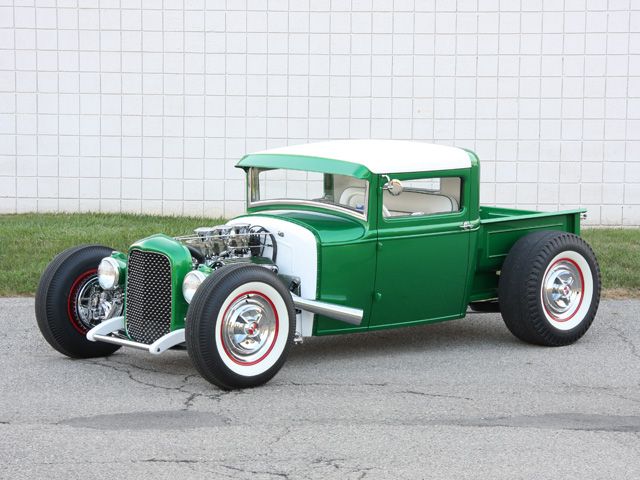
The owner of this pickup built it--including every panel of the cab and bed--from scratch and out of aluminum. Regular readers will recognize Jimmy's truck from the Kansas City Goodguys show, where it won a Top 100 award when it was still unpainted (a rarity for the magazine). Jimmy also painted the truck himself, and did the interior, too. About the only thing he didn't do was pour the iron for the 327's block
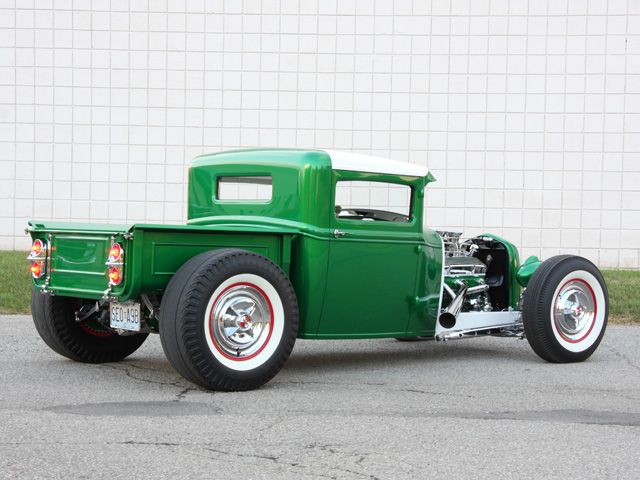

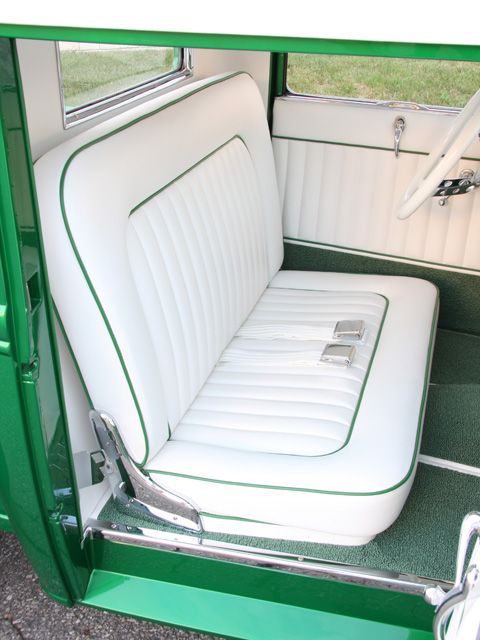
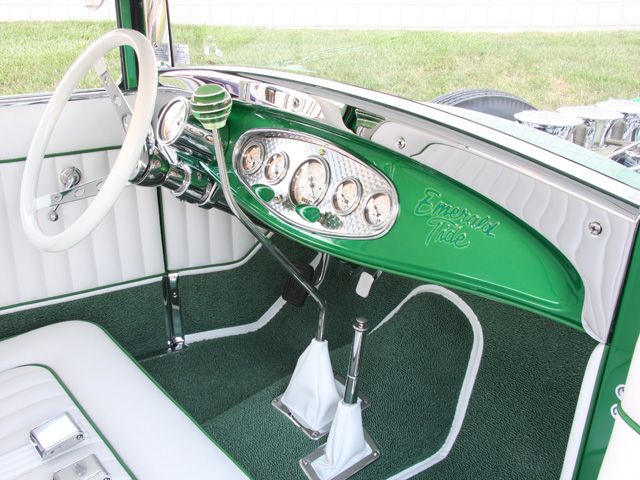
article original:
http://www.streetrodderweb.com/features/1007sr_jimmy_hervatin_1930_ford_pickup/
_________________
We don't care the People Says , Rock 'n' roll is here to stay - Danny & the Juniors - 1958
 Bolt`z Rod - 1930 Ford Sedan
Bolt`z Rod - 1930 Ford Sedan
_________________
We don't care the People Says , Rock 'n' roll is here to stay - Danny & the Juniors - 1958
 Re: 1930 Ford hot rod
Re: 1930 Ford hot rod
_________________
We don't care the People Says , Rock 'n' roll is here to stay - Danny & the Juniors - 1958
 Re: 1930 Ford hot rod
Re: 1930 Ford hot rod
_________________
We don't care the People Says , Rock 'n' roll is here to stay - Danny & the Juniors - 1958
 Re: 1930 Ford hot rod
Re: 1930 Ford hot rod
Peu importe, c'est bôôô !!

ChevyDave- Messages : 3899
Date d'inscription : 11/11/2012
 Re: 1930 Ford hot rod
Re: 1930 Ford hot rod
oui c'est bien celui la, le propriétaire est parti d'un dessin de Weesner pour inspiration.
 1930 Ford Model A STREET-ROD
1930 Ford Model A STREET-ROD

Fresh from the pages of Deluxe Car Kulture, Rod & Custom, and Rod & Kulture magazines, is this first time offered 30 all steel Street Rod.
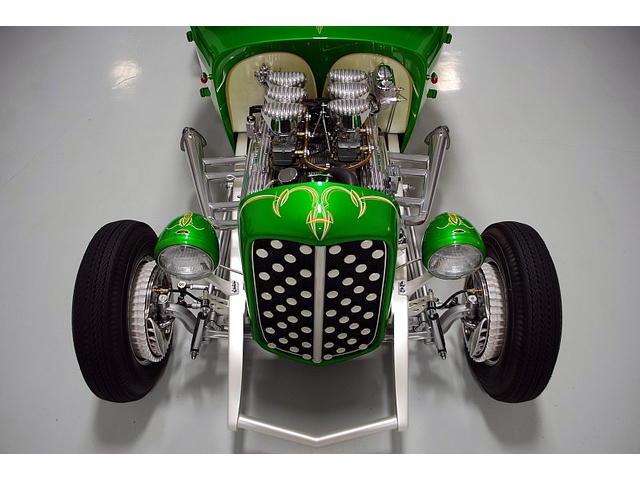
It is an amazing car that was built by some very talented professional builders, "Smokehouse Rods & Cycles", right here in Fredericksburg. With only 834 test and tune miles it is like a newly built car from the sixties. That era was the inspiration for this awesome show winning coupe.
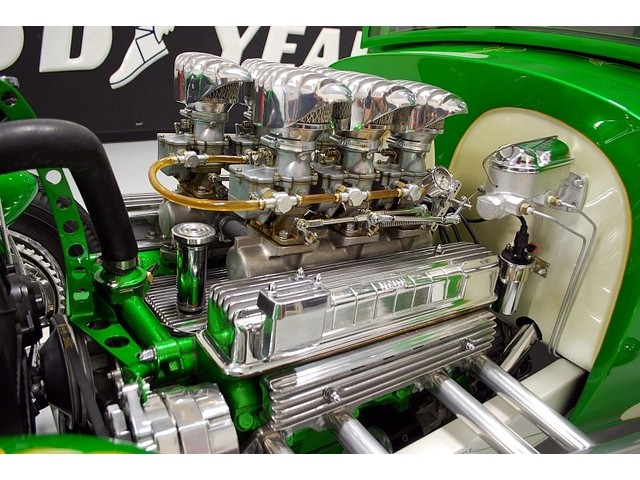
There is alot going on here so I will break it down for you like this: The body is chopped 2.5 inches, channeled 6 inches, one of a kind fabricated firewall, metal roof skin, dimpled drilled visor, and motorcycle gas cap. The grille is from a 32 Ford with handmade insert. The custom Candy-apple Green & Pearl White paint with custom scallops and pin stripes are simply eye popping! The stripes are under the clear coat so you can wax it up at the car show and not worry about putting distortion in the stripes. It was painted by Chris Reeh & Jim Strickland.

The results speak for themselves. The unique power plant is a Buick 401 "Nail-head" V-8 with Drag Star long intake, 6 Stromberg carbs, and Sanderson lake headers with baffles. The wiring and final tune up was completed by our own mechanics Clint and Craig. Is sounds intense and runs fantastic! A MSD and Petronix electronic ignition set up fires the powerful Buick motor. A Buick Turbo 400 automatic transmission feeds the GM 10 bolt posi rear end. The modified Ford frame features a front 4 link suspension and coil springs are out back. Firestone period correct wide white walls are 15 inch with the ole cheater slicks on the rear. The front brakes are disc with Buick covers and the rear are heavy duty drums. The interior has some very unique touches. The aluminum bomber seats with engine turned seat backs and sides are one of a kind. The upholstery is white pearl vinyl. The metal dash is filled with handsome working gauges. The shifter is a custom unit also.
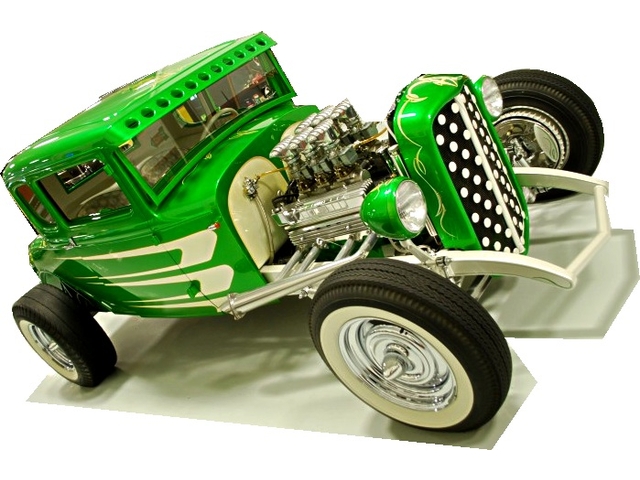
This built took on a life of its own and the final results screams sixties magazine quality with the today technology. You can just imagine how much time and money went into this truly one of a kind rod. Make it yours today and get ready to make all your street rod buddies jealous.
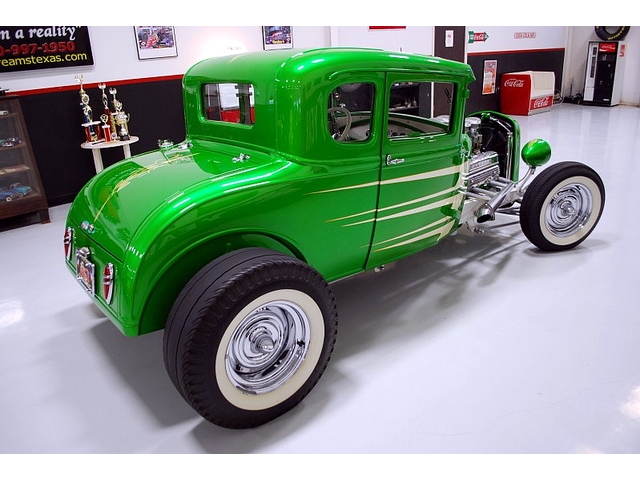
_________________
We don't care the People Says , Rock 'n' roll is here to stay - Danny & the Juniors - 1958
 Re: 1930 Ford hot rod
Re: 1930 Ford hot rod
_________________
We don't care the People Says , Rock 'n' roll is here to stay - Danny & the Juniors - 1958
 Real Steel Magazine Featured 1930 Coupe 383
Real Steel Magazine Featured 1930 Coupe 383

In the face of modern technology which continues to blow our minds with OEM quality and amazing custom cars, there is still something to be said about authenticity. Sure, tons of companies create super nice fiberglass replicas of some of the coolest Detroit metal to ever roll across Route 66; but at the end of the day, they're still just a copy of the real thing. Featured in the October 2010 issue of Street Rodder Magazine, this classic 1930 Ford coupe is a REAL DEAL, real steel street rod which combines the core strengths of its originality with a modern vision and top notch components. It is, by far, the nicest all steel street rod we've ever offered, and with its killer stroker motor, sophisticated suspension and completely custom interior, it'll chew up replicas on the street just as easily as it does on the show field. Are you one of those discerning gearheads who wants the excellent driving experience of modern street rod technology AND the authenticity of a real antique car? This world class Ford coupe is the opportunity you've been waiting for!
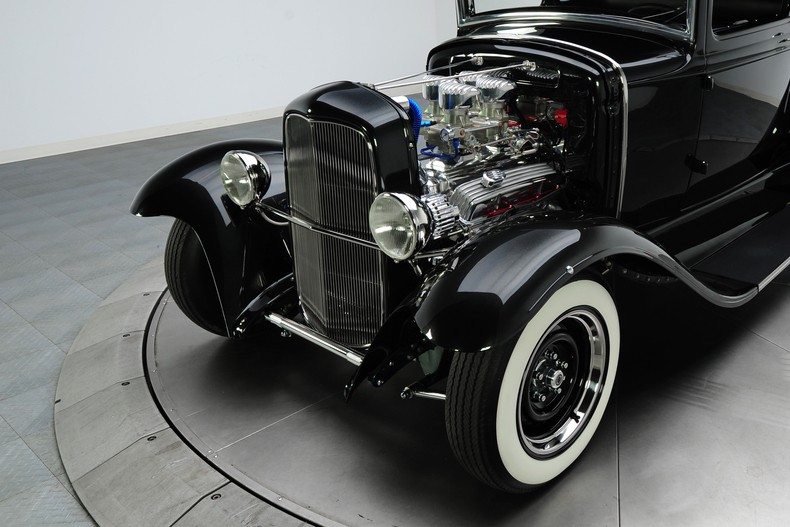
This hot coupes smooth and solid steel body began life as a run-of-the-mill 1930 Ford Model A that would stay in the hands of its original buyer for almost 76 years. When the new owner took possession, he promptly shipped it to Dragone Classic Motorcars in Bridgeport, Connecticut where it underwent a celebrity style restoration that totaled $96K in parts alone. Once the classic lines were laser straight, a spectacular coat of Mercedes-Benz Glasurit Dark Gray Metallic urethane was buried in a glossy and wet looking clearcoat shell and buffed to a dynamic shine. Today, five years and 2,600 hours of labor later, the car displays solid vertical panels and a perfectly aligned profile which looks absolutely fantastic under its chameleon paint. And with virtually no imperfections, it's a banner show piece that celebrates both 82 years of carefully calculated care by serious car guys and the integrity of Ford's high quality products.
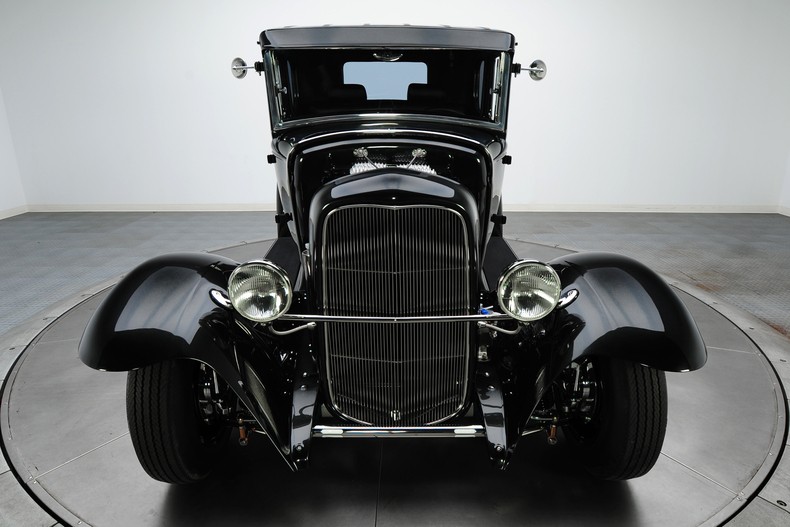
Everything on this 1930 Ford is exceptionally well-done. It mixes just the right amount of pre-war charm with high quality 21st century street rod details to produce gawking fans and create a lasting impression. At the front of the car, body-matched frame horns hold a polished spreader, which is complete with LED turn signals, below a correct stainless grille, a chrome headlight bar and two great looking 1932 Ford King Bee SS headlights. Behind that grille, stainless brace bars parallel full length Brookville fenders; and a chrome trimmed Brookville cowl anchors a like-new tilt windshield between chrome rearview mirrors and a small metal visor. At the top of the car, a steel ribbed roof insert hangs dark smoked glass above a Brookville decklid and lower lid panel. And at the back of the car, a familiar billet aluminum tag bracket is centered between 1950 Pontiac blue dot tail lights and a second polished spreader bar. The profile of the car combines the clean and simple look that is typical of classic fenderless hot rods with a number of traditional touches which add both style and character. Correct chrome door handles and correct bear claw hinges are present on the doors, and stylish chrome running boards seamlessly bridge the original front and rear fenders. Overall, this classic Ford street rod is in outstanding physical condition; and its top notch build integrates the greatest attributes of both old and new into a single, unifying vision which is the product of some of the best design and construction techniques in the hobby.
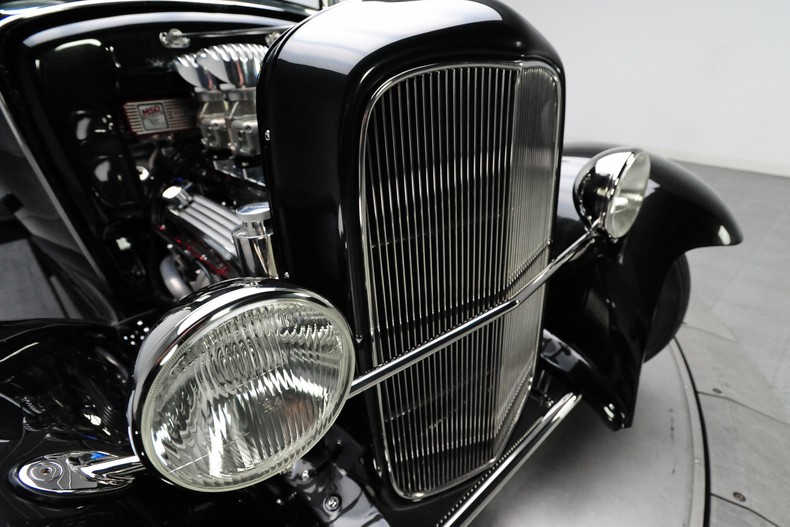
Take a gander behind the original stainless grille and you'll find out exactly where this Fords tradition ends and its muscle begins. Professionally built and dyno tuned by Smeding Performance in Rancho Cordova, California this coupes 383 cubic inch extreme stroker V8 creates a stout 450 horsepower and 470 lb./ft. of dust swirling torque! At the top of the engine, four Demon 98 series carburetors, which receive fuel through a braided fuel line, blue AN fittings, a fluid filled Holley fuel pressure gauge and a chrome Edelbrock mechanical fuel pump, prop trick Mooneyes finned air cleaners above a polished Barry Grant Quadra-Deuce induction. At the sides of that Barry Grant induction, polished Edelbrock Performer RPM heads, which have been fitted with 2.02 and 1.60 stainless valves and capped with finned and polished valve covers, sit above full floating hypereutectic 9.8 to 1 pistons and high strength 5140 forged steel connecting rods. Those rods are turned by a 4340 forged steel crank which has been micro polished to perfection, and those pistons create compression thanks to a custom ground hydraulic roller camshaft with a .510/.521 lift. Fire is supplied by an MSD Pro-Billet distributor which sends spark from an MSD Blaster SS coil and MSD 6A ignition system to Accel Extreme 9000 Ferro-Spiral wires. And cooling is provided by a Walker 32 style Z-series radiator which sends water past a Walker low profile electric fan and shroud to bright blue flex hose and a chrome water pump. At the front of the block, a Billet Specialties Tru Trac serpentine system spins a trick 140 amp billet aluminum alternator; and at the sides of the block, Sanderson ceramic coated shorty headers send spent gases into a great sounding exhaust system. As with its fully detailed exterior panels, nothing was missed in the engine bay of this sharp '30 Ford. The smooth and clean small block engine perfectly matches the car's Mercedes gray fenders. And show worthy ancillary items such as aluminum red wire looms, chrome motor mounts, a billet overflow tank and a polished stainless firewall add a nice finished look.

Underneath this impressive car, a custom, completely polished independent front suspension and a completely polished four link rear suspension utilize adjustable coil overs at each corner and anti-roll bars at each end, to provide a thoroughly modern ride and razor sharp handling characteristics. At the center of that custom suspension, a fresh TCI Auto Street Fighter Turbo-Hydramatic 400 3-speed automatic, which is equipped with a TCI Auto 3000/3400 Street Fighter torque converter and a finned pan and flywheel cover, sends power to a Currie nine inch rear end which carries stout 31 spline axles and ground pounding 3.55 gears. All that excellent metal is bolted to a Total Cost Involved frame which is painted metallic blue and sandwiched between stainless hardware and fresh Bitchin floor pans. Quick stops are provided by a frame mounted Summit Racing vacuum booster which pushes fluid through stainless AN lines to polished Wilwood Hi-Tech four piston calipers and giant 12 inch rotors. And a killer soundtrack is provided by a 2.5 inch true dual exhaust system which runs from the coated shorty headers to stainless Magnaflow mufflers and mandrel bent side pipes. At the corners of the car, 15 inch Coker powder coated smoothies spin 6.70-15 front and 8.20-15 rear Firestone 2.25 whitewall tires around stainless trim rings and chrome lug nuts. And everything from this hot rod Ford's C.W. Moss Oak reinforced floor pan to its chrome oil pan is exceptionally clean, completely detailed for show and ready to hit the road tomorrow.
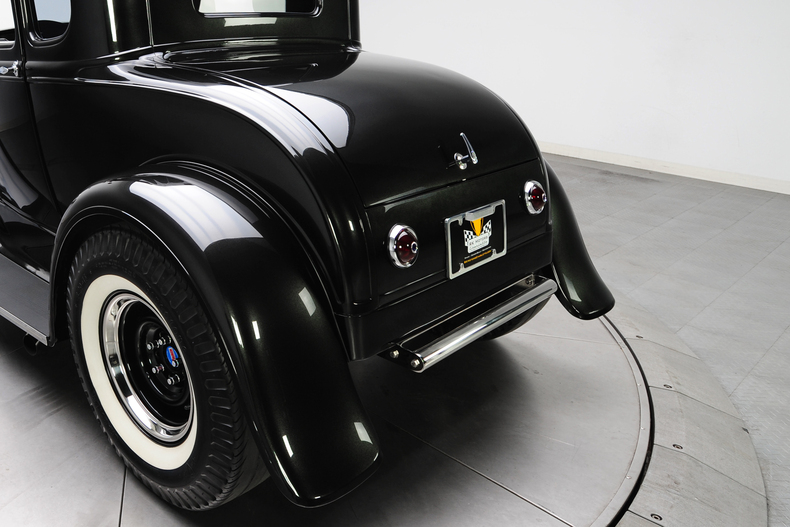
Take a look inside the car and you'll find a spectacular looking leather interior that was professionally installed by Dragone Classic Motorcars in Bridgeport, Connecticut. At the center of the car, a plush Wise Guys leather bench seat is firm, provides good support and features sturdy two-point seatbelts. And at the sides of the car, custom leather door panels, which are equipped with billet aluminum window cranks, billet aluminum door pulls, chrome door handles and integrated map pockets, hang between custom leather side panels. Below the seat, cool Mr. Horsepower floor mats ride next to a billet accelerator pedal, a chrome emergency brake handle and a stainless Gennie Commander Lo-stick shifter with a flame Lucite shift knob. And in front of the seat, the cars original body-matched dash hangs a full set of Classic Instruments Mooneyes gauges below stylish billet trim, a billet rearview mirror and a custom leather headliner. In front of the driver, a polished Mark IV steering wheel rides on a polished Ididit steering column; and behind the cockpit, a completely upholstered trunk integrates an RCI 15 gallon lightweight aluminum fuel cell behind a billet trimmed Optima battery and a Moroso master kill switch.
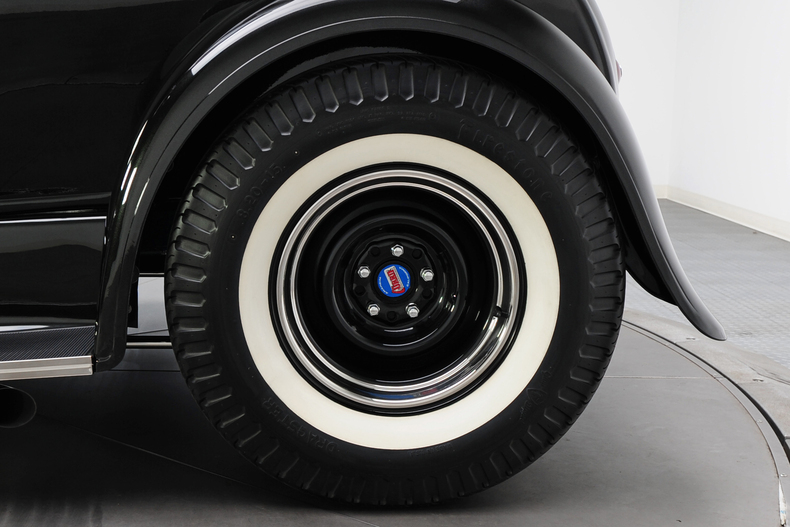
_________________
We don't care the People Says , Rock 'n' roll is here to stay - Danny & the Juniors - 1958
 Re: 1930 Ford hot rod
Re: 1930 Ford hot rod
_________________
We don't care the People Says , Rock 'n' roll is here to stay - Danny & the Juniors - 1958
 Re: 1930 Ford hot rod
Re: 1930 Ford hot rod
_________________
We don't care the People Says , Rock 'n' roll is here to stay - Danny & the Juniors - 1958
 1930 Model A pick up
1930 Model A pick up
_________________
We don't care the People Says , Rock 'n' roll is here to stay - Danny & the Juniors - 1958
 1930 Ford coupe 5 windows
1930 Ford coupe 5 windows
_________________
We don't care the People Says , Rock 'n' roll is here to stay - Danny & the Juniors - 1958
 Re: 1930 Ford hot rod
Re: 1930 Ford hot rod
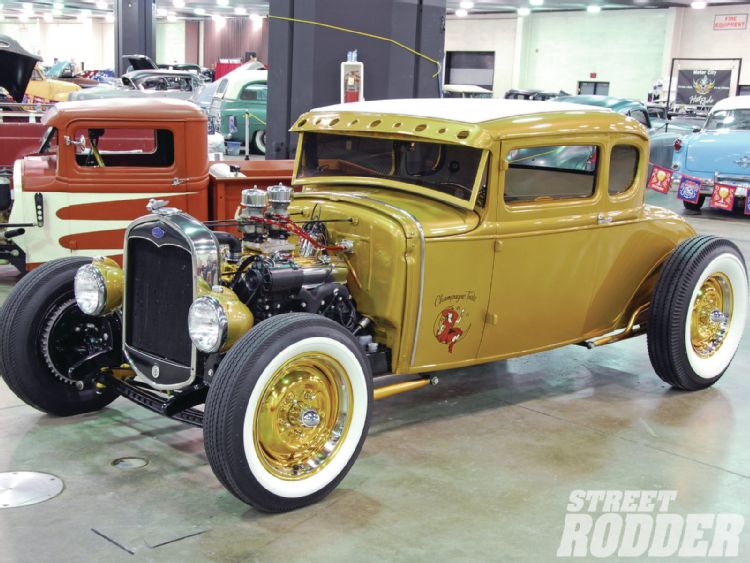
Fresh from the Gas Axe Garage, Dorr Johnson’s whacked ’30 Ford coupe caught our eye with its tasty gold-tone accents, two-pot fed 283ci Chevy, and classic traditional details.
Read more: http://www.streetrodderweb.com/events/1107sr_autorama_extreme_1953/photo_10.html
_________________
We don't care the People Says , Rock 'n' roll is here to stay - Danny & the Juniors - 1958
 Re: 1930 Ford hot rod
Re: 1930 Ford hot rod
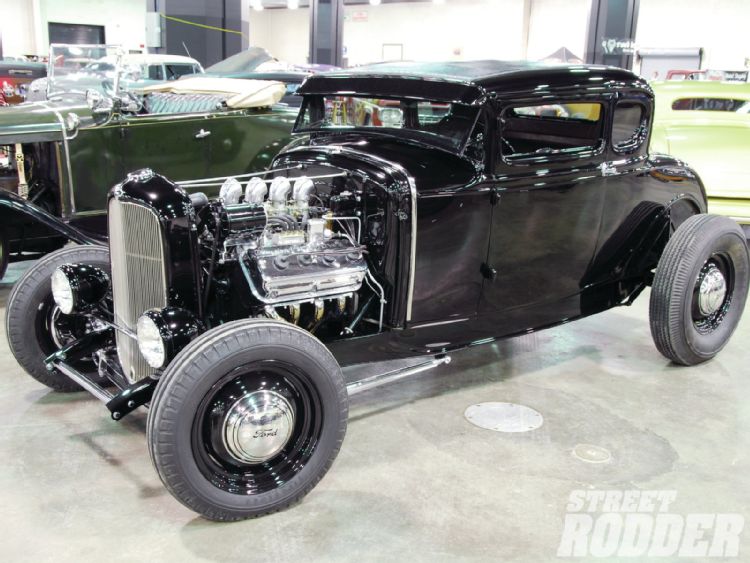
Hammered right, drenched in black, and loaded with a ’56 Chrysler 354ci Hemi topped with a Cragar four-pot, Rob Paul’s ’30 Ford coupe is pure hot rod.
Read more: http://www.streetrodderweb.com/events/1107sr_autorama_extreme_1953/photo_05.html
_________________
We don't care the People Says , Rock 'n' roll is here to stay - Danny & the Juniors - 1958
 1930 Ford coupe
1930 Ford coupe
_________________
We don't care the People Says , Rock 'n' roll is here to stay - Danny & the Juniors - 1958
 1930 Ford Model A - 5 window
1930 Ford Model A - 5 window
_________________
We don't care the People Says , Rock 'n' roll is here to stay - Danny & the Juniors - 1958
 1930 Ford sedan
1930 Ford sedan
_________________
We don't care the People Says , Rock 'n' roll is here to stay - Danny & the Juniors - 1958
 Re: 1930 Ford hot rod
Re: 1930 Ford hot rod
_________________
We don't care the People Says , Rock 'n' roll is here to stay - Danny & the Juniors - 1958
 1930 Ford hot rod
1930 Ford hot rod
_________________
We don't care the People Says , Rock 'n' roll is here to stay - Danny & the Juniors - 1958
 1930 Model "A" - Grass Hopper" - Super rides by Jordan
1930 Model "A" - Grass Hopper" - Super rides by Jordan
_________________
We don't care the People Says , Rock 'n' roll is here to stay - Danny & the Juniors - 1958
 '30 Ford Model "A" - Grass Hopper"
'30 Ford Model "A" - Grass Hopper"
_________________
We don't care the People Says , Rock 'n' roll is here to stay - Danny & the Juniors - 1958
Page 1 sur 7 • 1, 2, 3, 4, 5, 6, 7 
 Sujets similaires
Sujets similaires» Chicago Stock car - RC Ford A hot rod (radiocammendés ford 1930 plastique 1/18)
» Rat Rods - Galerie
» Hot rod gasser
» Hot rod racer
» Rod Riguez
» Rat Rods - Galerie
» Hot rod gasser
» Hot rod racer
» Rod Riguez
Page 1 sur 7
Permission de ce forum:
Vous ne pouvez pas répondre aux sujets dans ce forum
 Connexion
Connexion

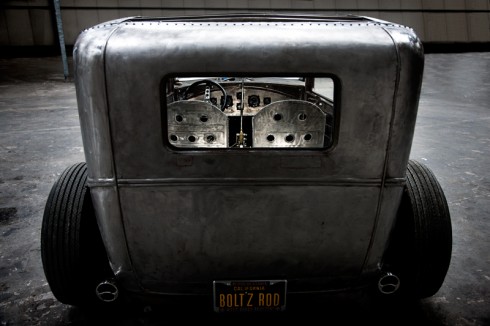
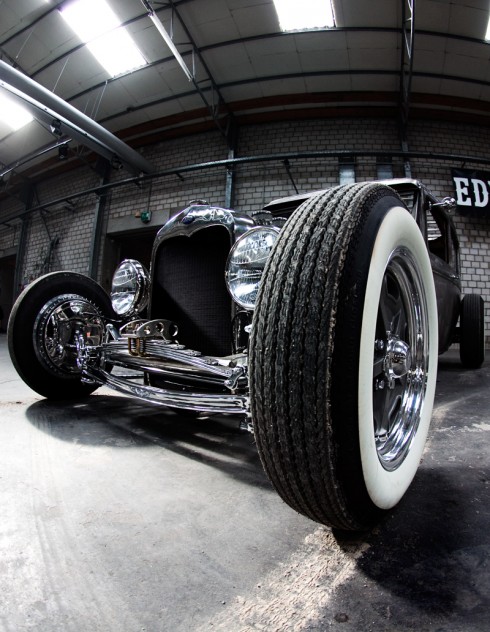


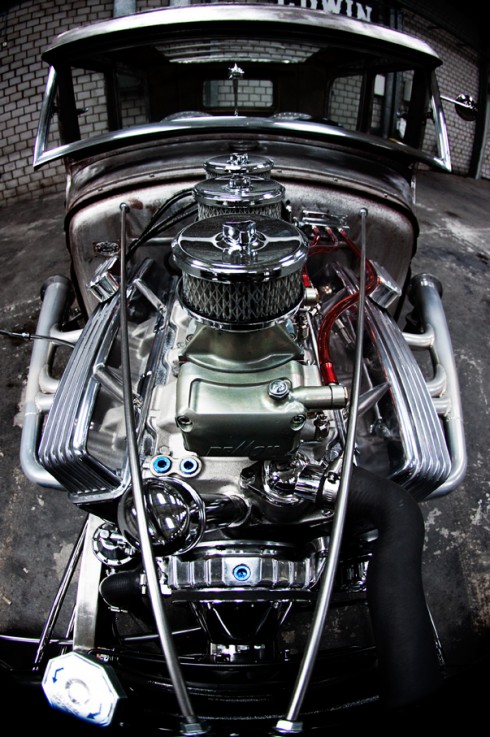
 je ne sais pas
je ne sais pas

